- CV Templates Simple Professional Modern Creative View all
- CV Examples Supermarket Student Cleaner Care Assistant Sales Assistant View all
- Cover Letter Templates Simple Professional Modern Creative View all
- Cover Letter Examples Care Assistant PhD Internship Cleaner Short View all
- Cover Letter Builder

PhD cover letter example
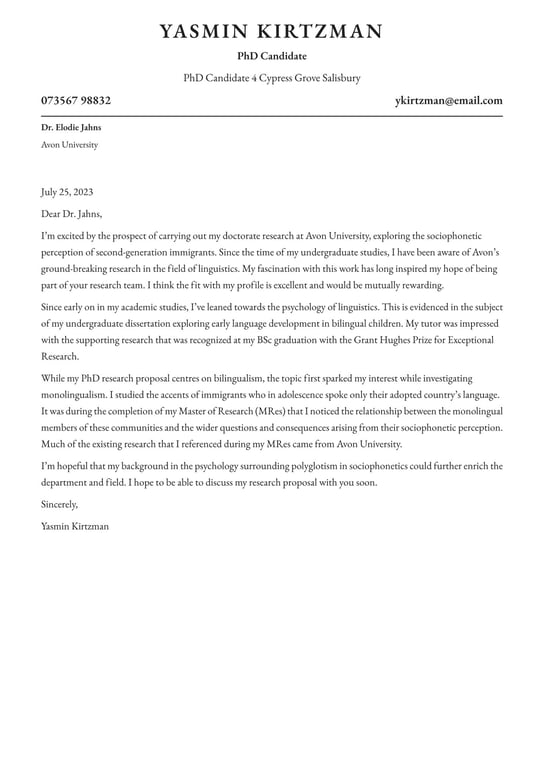
Introduction of a PhD cover letter
Phd cover letter body.
Ready to take your academic career to the next level? Your PhD supervisor must understand that you have the academic qualifications and motivation to take on the toughest challenge in further education.
Your academic CV will outline your educational achievements, but your PhD cover letter needs to show that you have the personality and drive to succeed.
PhD full text-only cover letter example
Dear Dr. Jahns,
I’m excited by the prospect of carrying out my doctorate research at Avon University, exploring the sociophonetic perception of second-generation immigrants. Since the time of my undergraduate studies, I have been aware of Avon’s ground-breaking research in the field of linguistics. My fascination with this work has long inspired my hope of being part of your research team. I think the fit with my profile is excellent and would be mutually rewarding.
Since early on in my academic studies, I’ve leaned towards the psychology of linguistics. This is evidenced in the subject of my undergraduate dissertation exploring early language development in bilingual children. My tutor was impressed with the supporting research that was recognized at my BSc graduation with the Grant Hughes Prize for Exceptional Research.
While my PhD research proposal centres on bilingualism, the topic first sparked my interest while investigating monolingualism. I studied the accents of immigrants who in adolescence spoke only their adopted country’s language. It was during the completion of my Master of Research (MRes) that I noticed the relationship between the monolingual members of these communities and the wider questions and consequences arising from their sociophonetic perception. Much of the existing research that I referenced during my MRes came from Avon University.
I’m hopeful that my background in the psychology surrounding polyglotism in sociophonetics could further enrich the department and field. I hope to be able to discuss my research proposal with you soon.
Yasmin Kirtzman
Sections of a PhD cover letter
Before you start writing your PhD cover letter, you need to know what to include. Let’s take a look at the elements that you need to have within this application letter now:
- Cover letter header . This part of your cover letter includes your basic details, including your name, location, and contact information.
- Greeting . Next up, make sure that the greeting you use is appropriate. This is a formal letter, so the tone you use here needs to reflect that.
- Introduction . Hook the reader’s interest by placing the most important information toward the top of your PhD cover letter.
- Body . Within the main body of your cover letter, you have the chance to share your career story. Ensure that you select the most valuable information.
- Conclusion . When you have written the bulk of the information, it’s time to conclude. You should end on a high and consider including a call to action.
- Signature . Finish your cover letter by using a polite and professional sign-off.
Each section of your PhD cover letter needs to serve a purpose. When you are writing this application letter, make sure that you think about what you want to include and what is not as important. That way, you can make sure that you get the most out of your letter.
You should aim for a one or two page cover letter as standard. Keeping things short and concise is the most logical approach. If you want to learn more about writing a cover letter from scratch , read our full guide.
Looking for some more inspiration to fuel your cover letter writing? Check out our related cover letter samples here:
- Academic cover letter sample
- Graduate cover letter sample
- Education cover letter sample
Why do you want to study this PhD subject, and how can you demonstrate that you have what it takes to come up with a ground-breaking piece of research?
Motivation needs to come first in your cover letter. A PhD is a tremendous undertaking—if you are not laser-focused on your why, doubts may arise. Consider sharing a part of your journey leading to this point, highlighting the PhD as a logical next step. You have likely been working towards this moment for many years. Share your struggles.
Engage the hiring professor’s attention by expressing the motivation behind your PhD goals in a relatable manner.
Dear Dr. Smith,
I’m thrilled by the prospect of pursuing my doctorate research at The University of Sheffield, exploring the impact of Ancient Greek art on pop culture. Since my undergraduate studies, I have had a deep-seated interest in this field of study and have read your prior paper on the topic.
Dear Taylor,
Please let me do my PhD at UoS. I am a hard-working student with a passion for history. I’m not sure what topic to cover yet but I know that you will guide me in the right direction.
Try to be as specific as you can here. The person reading your application will have to sift through a sea of candidates.
If you want to stand out from the crowd, include results-driven points. These are statements that you back up with the results you yielded. For example, you might discuss how your previous research was cited in an academic journal.
In the body of your cover letter, follow a clear template:
- Cover your skills and experience; explain why you are right for this program
- Showcase your existing knowledge of the topic
- Explore why your PhD topic is essential to the field
- Conclude with a strong statement
- End with a call to action that piques the reader’s interest
First body paragraph: your suitability for the role (skills & experience)
The middle part of a PhD cover letter should be packed relatively densely with the details of how your past research will qualify you to take the next academic step. Don’t just list down your achievements, offer a little more information about how you got there.
Here are some of the aspects you may want to include in your cover letter:
- Your experience in the field . What prior experience do you have in this subject? Detail your education and any anecdotal experience that may strengthen your case.
- The importance of the topic . PhDs are renowned for being competitive. If you want to gain a place, you need to convey why your research area is important.
- Goals and aims . What do you hope to achieve with this piece of research? What impact could it have on the future of the field and society as a whole?
- The knowledge you have . What knowledge do you have of the sector? How have you come to this point? What have you learned along the way?
- Academic recognition . If you have any academic recognition from awards bodies, this is the place to share. Embracing external perspectives on your work is central to any PhD. Show that you seek out contrary opinions and look to inform your processes.
- Additional details . Add in any details that you are sure will support your application.
Get the tone right!
Remember that you are writing to an academic. For that reason, the tone that you use needs to be formal and highbrow. Make sure that you use the type of language that is expected of a PhD student within this application letter.
Second body paragraph(s): alignment with the university
Once you have hit the main points in the first paragraph, you need to align yourself with the university. Why have you chosen this institute to apply to? What do you know about the department, and how does your research fit into the existing work?
Take the time to research the university and learn all that you can. For example, Avon University lists the following values:
- “Motivating others to excel”
- “Transforming our ideas”
- “Making things happen”
- “Working together to achieve shared goals”
You might want to mention these within your PhD cover letter, or simply keep them in mind when you are writing this part of your application package.
Bullet-point your accomplishments!
Bullet points may help to highlight some of your key achievements. They offer the reader’s eye a break on the page.
Although bullet points don't typically belong in academic prose, they can have a useful place in a PhD cover letter. Starting with a powerful action verb , each bullet point should describe any accomplishment or contribution to past research activities. Incorporate quantifying numbers and provide context where possible.
Most PhD students will be curious as to how their work will fit into the hiring department’s overall strategy. While most of your questions should be reserved for the interview process, a carefully targeted question in the cover letter can show that you have considered the most nuanced angles of the PhD opportunity.
Tell your future supervisor what you are keen to discuss during an interview. Let the recruiting team imagine meeting you.
Call to action & conclusion: Finish off strong
A powerful conclusion for a PhD cover letter might focus on the impact of your PhD work. Show that you have some real-world experience in your field and tell the supervisor why your work will move the needle.
While you cannot know the exact outcomes of your work at this early stage, it is perfectly acceptable to hypothesise. If you do not express any sense of purpose for your work in these final words, the interviewer may question your motivations.
Lastly, and maybe most importantly, say how keen you are to discuss your ideas further during an interview. Adopt a hopeful tone in your “call to action” without sounding presumptuous.
Depending on the faculty's prestige, it may receive hundreds of applications, so don’t assume that you will secure an interview. Gently say how much you would value the chance to find out more. Hopefully, the PhD supervisor will feel the same way.
Optimise for the ATS
The Applicant Tracking System (ATS) is software that filters incoming applications. The program ranks CVs and cover letters by how well they meet the criteria of the position.
Some universities may manage applications using this software. Give yourself the best odds of success by making sure that you optimise your PhD cover letter.
Review the department’s content and look at the topics highlighted. If possible, pick out keywords that you can weave throughout your cover letter.
- “Peer-reviewed”
- “Methodology”
- “Data collection”
End on an optimistic note by restating your potential value as a PhD hire, with a call to action that puts some onus on the faculty to follow up.
Look at a PhD cover letter sample conclusion:
Key takeaways
Your PhD cover letter has two goals: to show the reader why this research is essential and to prove that you are the perfect candidate for the job. Make sure you detail your prior experience, your existing research skills , and your in-depth knowledge of the research area.
Share your journey up to this point and explore how the PhD work is merely the next step. You should also showcase examples of determination and resilience since completing a PhD is demanding.
Get started now by using our simple cover letter builder tool.
Free professionally designed templates
- How to Write a Cover Letter for PhD Applications
Written by Chris Banyard
An PhD cover letter is one of the documents you may be required to submit as part of a PhD application . It should complement your academic CV and explain why you are applying. PhD cover letters offer you the chance to write with greater flexibility and personality than in other parts of the PhD application. This page will take you through what a PhD cover letter actually is and how to write one, along with some top tips on what to include (and what not to!).
Pick the right programme for you
There are lots of choices, let us help you to make the right one. Sign up to our weekly newsletter for the latest advice and guidance from our team of experts.
On this page
What is a cover letter for a phd application.
A PhD cover letter is a counterpart to a CV submitted as part of an application for a PhD programme. It is a short essay addressed to a specific individual and written in prose. It should explain your PhD application in your own words, demonstrating what you can offer and why you should be selected.
What is an academic cover letter for?
There are several reasons why the PhD cover letter is important for university admission. It is an opportunity to:
- Clarify any gaps in the CV and explain certain aspects in further detail. This doesn't mean you should repeat information on your CV (the letter will probably be read in parallel). Rather, it’s a chance to expand on the story that the CV tells and demonstrate your knowledge.
- Further tailor your PhD application to the project specification. Here, you can address and match your skills and experiences to those asked for by the university or supervisor.
- Show professional communication skills and enthusiasm . These are important qualities for a postgraduate applicant, but they can be quite hard to show in a CV or application form. Here, you can write in your own words and present your research interests and passion.
Do I need a cover letter for a PhD application?
Many universities require an academic cover letter as part of the PhD application. It is therefore highly likely that you'll have to write at least one. If you're applying for multiple PhD projects then you will need to make sure you tailor your cover letter for each application.
Cover letters vs personal statements for a PhD application
Although there are similarities between a motivation or cover letter and a personal statement , they are different. A cover letter is more functional - it unites and presents your application. A personal statement is more useful for providing detail on your experience, interests and ambitions. If you are submitting both, you may need to keep this in mind and adjust the detail in each.
What if I don’t have research experience?
Although a PhD cover letter is a good place to expand on any research experience and publications you may have, as Bachelors or Masters students you will not be expected to have lots of this.
It’s more important to write with enthusiasm and show your commitment for research. Fortunately, the academic covering letter is an ideal place to show this!
What to include in a cover letter for a PhD application
The first thing you should include in your cover or motivation letter is a few introductory sentences . Outline who you are, what you are currently doing, whether it be a Masters or a job, and what PhD position you’re applying for. Make sure to include the PhD project reference number if one is provided in the description.
Next, you’re going to want to explain why you are applying for the PhD position. It’s a good idea to put your best, most compelling, or most relevant argument first. The earlier that you can make an impact, the more likely the addressee will read further.
Make sure you’re to the point and concise. An academic cover letter may be there to help illustrate your personality and passion but academics do not have the time to read elongated essays.
After detailing why you want to apply for the project, you need to explain why you’re eligible . Present you relevant skills and achievements in a brief and precise manner. Additionally, make sure to back up your claims with evidence.
An important tip is to demonstrate that you have done your research about the PhD project, supervisor and department. Be specific about why you would be a good fit for the this project in particular .
You should also detail clear understanding of the potential research impact the PhD project could have, and your enthusiasm for it. But, make sure your passion is routed in some research. Just discovering the unknown or novel may not be a compelling reason to research your subject.
Overall, the academic cover letter should show a clear identity and personality, while remaining professional. You need to demonstrate why you are a better and more interesting candidate than other applicants for a PhD.
What to avoid in a cover letter for a PhD application
The academic cover letter will accompany the CV , and therefore should not repeat anything on it. You should refer to information but not reiterate it.
You should also avoid listing all of your achievements, experience etc. It is better to focus on the best aspects of your PhD application.
There should be no statements presented without evidence. A PhD supervisor will see through this straight away.
Also, an ideal motivation letter should avoid offering too much information. This includes technical information, jargon and abbreviations. Focus on being clear and concise instead.
Lastly, you should avoid any vagueness, arrogance, or negativity. And make sure there are no typos or grammatical mistakes.
Formatting a cover letter for a PhD application
The formatting rules for an academic covering letter are very similar to those for a CV. Ensure there is correct spelling and grammar throughout, use consistent and clear font, and get the tone right – this should be enthusiastic and assertive without arrogance.
How long should a cover letter be?
The cover/motivation letter for a PhD application should be approximately one A4 page in length, or around 500 words. If necessary, it can be a little longer but should not be longer than two pages.
Organisation
An academic cover letter should have a beginning, middle and end.
The introduction should explain who you are, what you are applying for and how you started this application (i.e. where you heard about the PhD project, or if you have previously met the supervisor). You can also give a brief background about yourself and your research interests.
The main body should cover your skills and achievements as a counterpart to the CV. This should present your convincing argument as to why you should be accepted for a PhD position. You can also present your ideas for your future research.
Finally, the conclusion should explain why you want to study the PhD project and why you are a perfect fit. It should summarise your application as a whole. It can end with a respectful request to take the application further, such as an interview.
Who should a PhD cover letter be addressed to?
A cover letter should be addressed to a named person i.e. “Dear Professor Smith”. For a PhD application, this will usually be the PhD supervisor, but may be a specific person in charge of recruitment.
If you are still unsure who to address the cover letter to, it should be directed to the Head of Department.
Check that you have the correct title for the addressee.
How to end an academic cover letter?
Because the cover letter should be addressed to a named individual, it should be signed off with either “Yours sincerely” or “Kind regards”. Prior to this, it may be worth adding a polite prompt to reply, such as “I look forward to hearing from you”.
Still searching for a Phd?
Browse PhD listings and filter by topic, location, funding and more.
Our postgrad newsletter shares courses, funding news, stories and advice
You may also like....

We've answered some of the most frequently asked questions about PhDs, covering course types, applications, funding and the benefits of further study.

Getting ready to apply for a PhD? Our guides explain research proposals, references and entry tests for doctoral programmes.

Understand what a successful PhD research proposal needs to include and how to go about writing one for your project application.

Our guide explains how to contact a potential PhD supervisor to discuss your proposal or ideas with them before applying.
FindAPhD. Copyright 2005-2024 All rights reserved.
Unknown ( change )
Have you got time to answer some quick questions about PhD study?
Select your nearest city
You haven’t completed your profile yet. To get the most out of FindAPhD, finish your profile and receive these benefits:
- Monthly chance to win one of ten £10 Amazon vouchers ; winners will be notified every month.*
- The latest PhD projects delivered straight to your inbox
- Access to our £6,000 scholarship competition
- Weekly newsletter with funding opportunities, research proposal tips and much more
- Early access to our physical and virtual postgraduate study fairs
Or begin browsing FindAPhD.com
or begin browsing FindAPhD.com
*Offer only available for the duration of your active subscription, and subject to change. You MUST claim your prize within 72 hours, if not we will redraw.

Do you want hassle-free information and advice?
Create your FindAPhD account and sign up to our newsletter:
- Find out about funding opportunities and application tips
- Receive weekly advice, student stories and the latest PhD news
- Hear about our upcoming study fairs
- Save your favourite projects, track enquiries and get personalised subject updates

Create your account
Looking to list your PhD opportunities? Log in here .
PHD Application cover letter examples
As the highest postgraduate qualification you can achieve, it’s no wonder that most PhD programs require a cover letter as part of the application process.
So, if you’re hoping to complete your doctorate, you need to brush up on your writing skills and prove why you deserve a place in the program.
To help you do that, we’ve put together this comprehensive guide, complete with PhD cover letter examples to support your application.
CV templates
PHD Application cover letter example 1
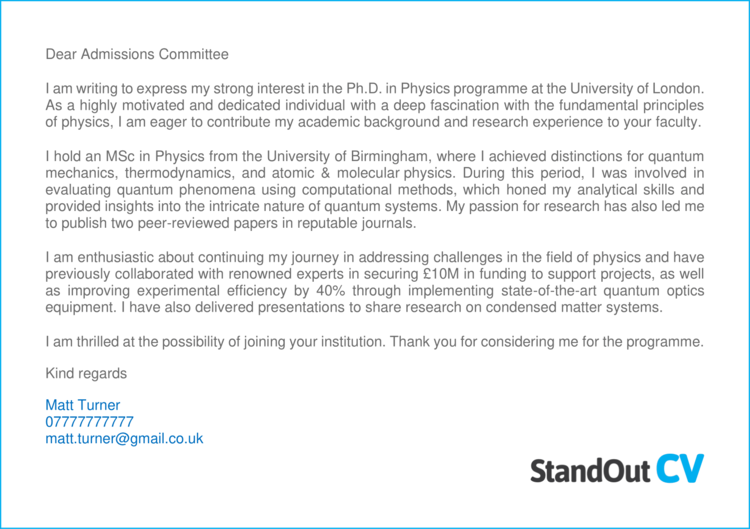
Build your CV now
PHD Application cover letter example 2
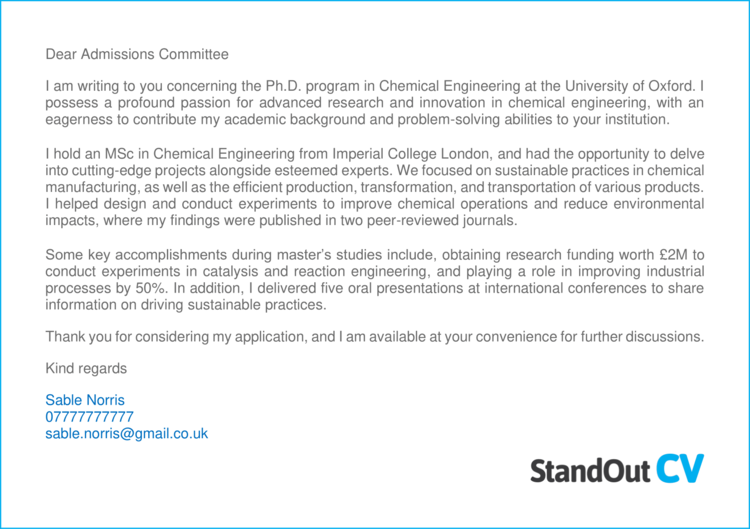
PHD Application cover letter example 3
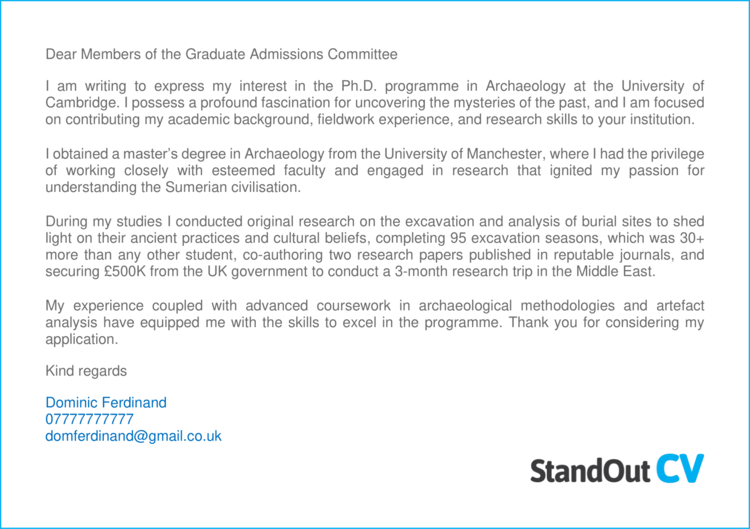
The example cover letters here should give you a good general idea on how your PHD Application cover letter should be formatted and written.
The rest of this guide gives more specific guidance on how to create your own cover letter in this format, and even includes some templates you can copy and paste.
How to write a PHD Application cover letter
A simple step-by-step guide to writing your very own winning cover letter.

Write your cover letter in the body of an email/message
When writing your PHD Application cover letter, it’s best to type the content into the body of your email (or the job site messaging system) and not to attach the cover letter as a separate document.
This ensures that your cover letter gets seen as soon as a recruiter or employer opens your message.
If you attach the cover letter as a document, you’re making the reader go through an unnecessary step of opening the document before reading it.
If it’s in the body of the message itself, it will be seen instantly, which hugely increases the chances of it being read.

Start with a friendly greeting

Start you cover letter with a greeting that is professional but friendly.
This will build rapport with the recruiter whilst showing your professionalism.
- Hi, hope you’re well
- Hi [insert recruiter name]
- Hi [insert department/team name]
Avoid overly formal greetings like “Dear sir/madam ” unless applying to very traditional companies.
How to find the contact’s name?
Addressing the recruitment contact by name is an excellent way to start building a strong relationship. If it is not listed in the job advert, try these methods to find it.
- Check out the company website and look at their About page. If you see a hiring manager, HR person or internal recruiter, use their name. You could also try to figure out who would be your manager in the role and use their name.
- Head to LinkedIn , search for the company and scan through the list of employees. Most professionals are on LinkedIn these days, so this is a good bet.
Identify the role you are applying for
Once you’ve opened up the cover letter with a warm greeting to start building a relationship, it is time to identify which role you want to apply for.
Recruiters are often managing multiple vacancies, so you need to ensure you apply to the correct one.
Be very specific and use a reference number if you can find one.
- I am interested in applying for the position of *specialist field PHD Applicant* with your company.
- I would like to apply for the role of Sales assistant (Ref: 406f57393)
- I would like to express my interest in the customer service vacancy within your retail department
- I saw your advert for a junior project manager on Reed and would like to apply for the role.
See also: CV examples – how to write a CV – CV profiles
Highlight your suitability
The main purpose of your cover letter is to excite recruiters and make them eager to open your CV. And you achieve this by quickly demonstrating your suitability to the job you are applying for.
Take a look at the job adverts you are applying for, and make note of the most important skills being asked for.
Then, when you write your cover letter, make your suitability the focal point.
Explain how you meet the candidate requirements fully, and why you are so well suited to carry out the job.
This will give recruiters all the encouragement they need to open your CV and consider your application.

Keep it short and sharp
A good cover letter is short and sharp, getting to the point quickly with just enough information to grab the attention of recruiters.
Ideally your cover letter should be around 4-8 sentences long – anything longer will risk losing the attention of time-strapped recruiters and hiring managers .
Essentially you need to include just enough information to persuade the reader to open up your CV, where the in-depth details will sit.
Sign off professionally
To round of your CV, you should sign off with a professional signature.
This will give your cover letter a slick appearance and also give the recruiter all of the necessary contact information they need to get in touch with you.
The information to add should include:
- A friendly sign off – e.g. “Kindest regards”
- Your full name
- Phone number (one you can answer quickly)
- Email address
- Profession title
- Professional social network – e.g. LinkedIn
Here is an example signature;
Warm regards,
Jill North IT Project Manager 078837437373 [email protected] LinkedIn
Quick tip: To save yourself from having to write your signature every time you send a job application, you can save it within your email drafts, or on a separate documents that you could copy in.

What to include in your PHD Application cover letter
Here’s what kind of content you should include in your PHD Application cover letter…
The exact info will obviously depend on your industry and experience level, but these are the essentials.
- Your relevant experience – Where have you worked and what type of jobs have you held?
- Your qualifications – Let recruiters know about your highest level of qualification to show them you have the credentials for the job.
- The impact you have made – Show how your actions have made a positive impact on previous employers; perhaps you’ve saved them money or helped them to acquire new customers?
- Your reasons for moving – Hiring managers will want to know why you are leaving your current or previous role, so give them a brief explanation.
- Your availability – When can you start a new job ? Recruiters will want to know how soon they can get you on board.
Don’t forget to tailor these points to the requirements of the job advert for best results.
PHD Application cover letter templates
Copy and paste these PHD Application cover letter templates to get a head start on your own.
Dear Admissions Committee
I am writing to express my strong interest in the Ph.D. in Physics programme at the University of London. As a highly motivated and dedicated individual with a deep fascination with the fundamental principles of physics, I am eager to contribute my academic background and research experience to your faculty.
I hold an MSc in Physics from the University of Birmingham, where I achieved distinctions for quantum mechanics, thermodynamics, and atomic & molecular physics. During this period, I was involved in evaluating quantum phenomena using computational methods, which honed my analytical skills and provided insights into the intricate nature of quantum systems. My passion for research has also led me to publish two peer-reviewed papers in reputable journals.
I am enthusiastic about continuing my journey in addressing challenges in the field of physics and have previously collaborated with renowned experts in securing £10M in funding to support projects, as well as improving experimental efficiency by 40% through implementing state-of-the-art quantum optics equipment. I have also delivered presentations to share research on condensed matter systems.
I am thrilled at the possibility of joining your institution. Thank you for considering me for the programme.
Kind regards
Matt Turner
I am writing to you concerning the Ph.D. program in Chemical Engineering at the University of Oxford. I possess a profound passion for advanced research and innovation in chemical engineering, with an eagerness to contribute my academic background and problem-solving abilities to your institution.
I hold an MSc in Chemical Engineering from Imperial College London and had the opportunity to delve into cutting-edge projects alongside esteemed experts. We focused on sustainable practices in chemical manufacturing, as well as the efficient production, transformation, and transportation of various products. I helped design and conduct experiments to improve chemical operations and reduce environmental impacts, where my findings were published in two peer-reviewed journals.
Some key accomplishments during master’s studies include, obtaining research funding worth £2M to conduct experiments in catalysis and reaction engineering, and playing a role in improving industrial processes by 50%. In addition, I delivered five oral presentations at international conferences to share information on driving sustainable practices.
Thank you for considering my application, and I am available at your convenience for further discussions.
Sable Norris
Dear Members of the Graduate Admissions Committee
I am writing to express my interest in the Ph.D. programme in Archaeology at the University of Cambridge. I possess a profound fascination for uncovering the mysteries of the past, and I am focused on contributing my academic background, fieldwork experience, and research skills to your institution.
I obtained a master’s degree in Archaeology from the University of Manchester, where I had the privilege of working closely with esteemed faculty and engaged in research that ignited my passion for understanding the Sumerian civilisation.
During my studies I conducted original research on the excavation and analysis of burial sites to shed light on their ancient practices and cultural beliefs, completing 95 excavation seasons, which was 30+ more than any other student, co-authoring two research papers published in reputable journals, and securing £500K from the UK government to conduct a 3-month research trip in the Middle East.
My experience coupled with advanced coursework in archaeological methodologies and artefact analysis have equipped me with the skills to excel in the programme. Thank you for considering my application.
Dominic Ferdinand
Writing an impressive cover letter is a crucial step in landing a place on a PHD, so taking the time to perfect it is well worth while.
By following the tips and examples above you will be able to create an eye-catching cover letter that will wow recruiters and ensure your CV gets read – leading to more job interviews for you.
Good luck with your job search!
- Resume Writing
- Resume Examples
- Cover Letter
- Remote Work
- Famous Resumes
- Try Kickresume
Cover Letter for PhD Application: Guide for Writing One & Example From a Real PhD Student
- Klara Cervenanska ,
- Updated March 27, 2023 9 min read
When applying for a PhD research position, you usually need to submit certain documents, including an academic CV and a cover letter for PhD application .
A PhD cover letter, also referred to as an academic cover letter, should be carefully crafted, well-formatted, and contain specific sections.
We'll show you how to do exactly that, along with a sample of an academic cover letter from a real person admitted to a PhD program at Lyon University in France.
And if you're not sure how to go about writing your PhD CV, check out this article: CV for PhD Application: How to Write One Like a True Scholar (+CV Example) .
Table of Contents
Click on a section to skip
What is an academic cover letter?
What to include in a cover letter for phd application, how to write a cover letter for phd application, how to format an academic cover letter, phd cover letter sample.
An academic cover letter is a document that PhD candidates submit alongside their academic CV when applying for a PhD.
Essentially, it's a cover letter for a PhD application.
It's not exactly the same as your regular business cover letter. Nor is it the same as a personal statement or a motivation letter .
The purpose of a cover letter for PhD application is to explain to the reader, who's likely a researcher or a professor, what you can contribute to their institution and/or field.
Moreover, in a PhD application cover letter, you should explain why you're a good match for the research position on the program.
Differences between academic cover letter and business cover letter
Both these documents serve different purposes and people use them in different settings:
- Academic cover letter is used when applying for positions in academia — most often for a PhD. More emphasis should be on education, research background and scholarly accomplishments. Moreover, it should explain what your contribution to the institution or field could be. It should also point the reader to your academic CV.
- Regular (business) cover letter is normally used when applying for any kind of job . Hence, more emphasis should be on skills and past experience while being tailored to a specific job position. You should also explain why you're a good fit for the position at the given company. It should point the reader to your resume.
There are also other documents people often mistake for an academic cover letter. These include:
- Motivation letter is especially relevant for fresh graduates when applying to a university, a non-profit organization, or voluntary work. A motivation letter focuses more on your interests and motives for applying.
- Personal statement. Also used in an academic setting. It's always written by an applicant, often a prospective student, applying to college, university, or graduate school. You explain why you've chosen a particular course and why you'd be good at it. Other names include a statement of purpose or a letter of intent .
Like every cover letter, an academic one also needs to include specific elements and content sections. These are:
- Header. Here, provide your contact information, such as your name, address, phone number, and email in the header of the document.
- Formal salutation. In an official letter like this one, you should address the reader in a professional and formal way. If you know who'll be reading your cover letter, go with Dear Dr. [Surname] or Dear Professor [Surname] . If you don't, go with Dear Sir/Madam .
- The specific PhD program or position. Clearly state in your letter which research position you're applying for or the name of the PhD program. A cover letter is usually read before a CV, so you need to make sure everything is clear.
- Your motivation. Explain why you're interested in the specific PhD position — it's one of the key elements you should include.
- Your academic background. Now, we don't mean you should list in detail every single university course you ever took. Instead, focus on the most relevant course for the PhD and describe in detail what you learned, any projects you worked on, why it was interesting (and optionally, what knowledge gap you identified). In this way, you also show a certain level of understanding of the field.
- Your ambition. Briefly mention what your ambitions, intentions, and plans are regarding your contribution to the field when securing your PhD position. How is your research going to enrich the field? How will the institution benefit from it?
- Conclusion. Keep the conclusion short. Contrary to a regular cover letter ending , there's no place for reiterating everything here. Simply thank the reader for your consideration and prompt them to read your academic CV.
- Formal sign-off. Just pick from the usual: Sincerely, Respectfully, Regards... Then throw in your full name in the following line.
And that's all you need to include!
Now, let's take a look at how to write your cover letter step-by-step.
Applying for a PhD will be a lot less stressful if you follow these tips on how to write a cover letter for a research position:
Consider researching the background of the organization, department, ongoing research projects, and their past and current projects. All that before you start writing your cover letter. Knowing these things will help you tailor your letter to the specific PhD opening.
Before you actually start writing, try to sit down and take a moment to think first. Assess how your past experiences helped you prepare for the PhD position and scribble down those that are most relevant and significant for the specific program. These include any research experiences, research projects, courses, or internships.
In the first few sentences of your letter, you need to convey some basic information about yourself and what specific position you're applying for. The opening should also state firmly why you're a strong candidate for the position/program, by using a persuasive and convincing wording. Here's an example: "As an MChem Chemistry graduate with a narrow focus on the sustainable synthesis of biologically active molecules from the University of Dundee, I am excited to apply to a "Synthesis Of Small Molecule Inhibitors Using Enzymes" PhD programme at an institution with such a strong foundation and numerous research groups in this field."
This is the place where you may explore more extensively on the educational journey that brought you here. Set the foundation for demonstrating how your Master's degree and research experience seamlessly translate into the next phase — the PhD program. Emphasize how your thesis contributes to the field's body of knowledge. Mention any other publications that support your thesis. And, if you can, identify any knowledge gaps or topics that can be explored further.
This paragraph provides the opportunity to neatly tie in together everything the reader has learned about you so far. You can show how your previous experience, coupled with what you'll learn during the PhD program, will come together to produce something novel to enrich the field. First, identify the courses or topics within the PhD program that interest you the most and how they relate to you developing your research further. Second, introduce your future research aspirations and goals. Third, point out how this future work will enrich the field and what will the intellectual merit be.
When ending your PhD cover letter, briefly refer your reader to your academic CV and encourage them to examine all of the remaining projects, courses, publications, or references . Finally, thank the reader for their time and consideration and let them know you look forward to hearing from them. Sign off.
Put the letter in a drawer and don't think about it for a day or two. Then, when you read it again, you'll have a fresh pair of eyes to see the cover letter in a new light. Maybe you decide some things are redundant, or you think of something that's more relevant. Or you know, find a typo here and there.
Just like an academic cover letter needs to contain certain content components, the formatting should also align with the structural expectations for this type of document.
How long should a cover letter be? How to finish a cover letter? And what about the cover letter font and spacing?
Here's a recommended academic cover letter format:
- Length. While STEM PhD candidates should aim for half a page to one page, humanities candidates can do 1–2 pages.
- Font. Use one of the classics: Times New Roman, Calibri, or Arial. Just no Comic Sans, we beg you. Keep the size between 10–12 points. Also remember to keep the text clean — no underlining, no bolding, and no color. However, you can use italics if appropriate.
- Spacing. Cover letter spacing isn't complicated. Just single-space your text, make sure there's a space between each paragraph, and leave a space between the concluding paragraph and your formal sign-off.
- Margins. The only rule here is that the margins on your cover letter should match those on your CV.
- Consistence with your CV. Your academic cover letter should match your academic CV in all formatting aspects — including the cover letter font and spacing. For example, Kickresume lets you choose a matching template for your CV and your cover letter, so no need to worry about this.
If the institution provided any instructions for formatting your academic cover letter, don’t get creative and follow their guidelines.
Finally, to help you tie everything we talked about together, here's a cover letter sample from a real person admitted to a PhD program at Lyon University in France.
These things ensured Herrera's cover letter was successful:
- She clearly states her motivation in the opening. In the first two paragraphs, Herrera introduces herself and her motivation to apply for the given PhD program.
- She describes educational and research background thoroughly. The main body of the letter is dedicated to describing Herrera's educational background, research projects, internships, and skills acquired throughout the way.
- She presents research aspirations in the letter. Herrera writes: "I have a history of proven results and profound findings. Given opportunity, I’m confident in my abilities to earn similar ground-breaking results while being part of your team."
Even though this example lacks some of the key elements, such as mentioning the specific PhD program or identifying the topics within the PhD program that interest her the most, this PhD cover letter still managed to impress the University of Lyon.
Lyon University PhD Student Cover Letter Sample
Klara graduated from the University of St Andrews in Scotland. After having written resumes for many of her fellow students, she began writing full-time for Kickresume. Klara is our go-to person for all things related to student or 'no experience resumes'. At the same time, she has written some of the most popular resume advice articles on this blog. Her pieces were featured in multiple CNBC articles. When she's not writing, you'll probably find her chasing dogs or people-watching while sipping on a cup of coffee.
Related Posts
The cover letter is dead — who killed it (a murder mystery case), cover letter vs resume: 7 key differences and the art of writing them (+examples), share this article, join our newsletter.
Every month, we’ll send you resume advice, job search tips, career hacks and more in pithy, bite-sized chunks. Sounds good?

What Is a PhD Cover Letter?
What key points should i include within my phd application letter, tips to improve your phd application letter, example phd cover letter, final thoughts, phd cover letters.
Updated October 11, 2023

All products and services featured are independently selected by WikiJob. When you register or purchase through links on this page, we may earn a commission.
A PhD cover letter is an important part of your PhD application. Your cover letter (which may also be referred to as a motivational letter) focuses upon what makes you a great candidate and why you should be invited for interview.
This article will cover what a PhD cover letter is, when it would be used and how you can write a notable cover letter for your PhD application.
Your cover letter is your first opportunity to explain to the committee why you should be selected to study for your postgraduate doctorate. It not only demonstrates your personality, but it can also explain in your own words why the hiring panel should choose you as a PhD student.
Like most cover letters , your PhD application letter should complement, but not repeat, your CV. It should explain and expand on the details referenced within your CV or application form .
You should tailor the content to your chosen PhD topic – this will enable you to focus your specific expertise and academic achievements on your learning capabilities.
It should be noted that when it comes to submitting your application to study for a PhD, you may be required to submit a personal statement as well as a cover letter. Each university will have its own criteria, but note that a cover letter is different from a personal statement.
Your personal statement will focus upon your interests and your ambitions, whilst your PhD cover letter will be looking at your tangible achievements , such as your academic and professional experience.
If you are required to draft both statements, then try to keep this in mind during the writing process.

There are no rules for what to include within your PhD cover letter but, broadly speaking, your submission should include references to the following:
Who you are – what your personality is and what sets you apart from other potential PhD candidates. Your cover letter should be a sales tool that should make any committee want to choose you to join their team.
Your skills and achievements (along with any evidence to substantiate your claims).
Your research into the specific academic institution (why you want to attend that specific school and what makes it a good fit for you).
Your understanding of your research project and what you believe its impact may be upon your sector (this will demonstrate not just your knowledge of the research but will showcase your passion and motivation for the project).
How your specific skills are relevant to the application. Have you undertaken any work experience relevant to that field? Have you been inspired by what previous alumni have achieved?
As with all applications, writing a great cover letter is a skill. It requires you to tread the balance between explaining in detail who you are and why you should be chosen, while remaining concise. It needs to showcase your personality while remaining professional.
It’s a difficult writing skill and one which shouldn’t be rushed. You should take your time to craft your application letter – the more time that is spent on it, the greater your chance of success.
A practical tip is to use the ‘top-down’ approach . This is a writing skill often used by marketers and PR professionals whereby you incorporate the strongest arguments/details at the top and work your way down.
You need to ensure that if a committee member stops reading your cover letter at any point, then they have already noted the most pressing details.
How Do I Write My PhD Cover Letter?
An easy way to focus your thoughts when writing your application letter is to consider it as a way of telling your story, at least in relation to the PhD you are applying for. By this, we mean that your letter should have a clear beginning, middle and end.
Using this format as a guide, here are some examples of how to start writing your PhD cover letter.
Starting Your Cover Letter
As with any form of professional correspondence, do your due diligence and be confident that you know who to send your application to.
As previously mentioned, each school will have its own application criteria – for some, it may need to be addressed to a specific professor, whilst others may direct you to a department or someone responsible for all recruitment.
Make sure you find out their name – along with correct spellings and titles. This is your first chance to make a good impression, so you must pay attention to the details.
Introducing Yourself
A good place to start is to introduce yourself first. Ask yourself, who are you and why should the committee continue to read your application letter?
This is your opportunity to explain what PhD you are applying for and why you want to study further. You may want to start your storytelling in this section.
For example:
I became interested in this subject when I met [name], who is one of your alumni. They inspired me to want to continue my learning and further my knowledge, which has been developed through my professional experience at [company name].
As you can see from this example, the letter is starting to explain why the candidate wants to apply for the application, what inspires them to continue their learning and gives a look into their achievements. The result is that it makes the reader want to continue reading the letter.
Showcasing Your Skills and Achievements
The middle section is where you talk about what you have achieved and how you want to further your development and make an impact on your field of study.
This section should refer to your CV and provide greater insights into what you already know and why you would be a great candidate for the PhD programme.
You could use this section to briefly introduce what topic you believe would make a great research project.
As you can see from my enclosed CV, I have an extensive professional history within my sector. From my experience at [company name], I was able to focus upon my key specialisms, which led me to develop an interest in [project]. I believe that, due to the ever-changing nature of the profession, there is scope to continue the research into [subject] and I’m keen to combine my practical and theoretical knowledge in my research. I believe this is of value to not just myself and my peers but also my wider profession because of [detail].
Again, this is demonstrating a level of professionalism while starting to showcase exactly why you should be chosen to join the PhD programme. It shows that you’re not just thinking of yourself, you’re also considering the wider implications that your research may have upon your field of study.
Ending Your Cover Letter
As you draw towards the end of your cover letter, you may wish to reiterate why you want to study at this specific institution. Showing you have researched the university’s research reputation can go a long way to impressing hiring panels.
It may be globally renowned, or perhaps it’s a good fit for your specific area of interest. Maybe there’s a specific professor you would like to work alongside or maybe you’ve seen the career advancement of previous alumni. If you have a personal reason why you are a good fit for the school, then state it here.
Additionally, we would also recommend explaining what you plan to do with your research upon its completion. Hiring panels will be keen to find out how you plan to use your expertise and what your long term ambitions are.
I am particularly interested in joining the PhD programme at [school] because of your reputation as global research leaders. Throughout my career, I have strived to work alongside the best because I believe in the importance of peer learning. I am keen to work alongside your distinguished professors to carry out my research in [subject]. I believe that I am the right fit for your institution because of [x,y,z] and through my correspondence with [named contact of the previous alumni], I am aware of the help and support that you provide to your PhD applicants. Following on from the completion of my doctorate, I plan to use my knowledge to do [x,y,z].
As you sign off your cover letter, make sure you include a call to action. Encourage the panel to get in touch with you to arrange a formal interview or direct them to your CV so that they can be reminded of your experience.
You need to end the letter with no doubt that you are a good fit for the PhD programme and that you are an ideal candidate that they need to snap up.
I hope that this letter has given you some insight into my dedication to my learning and that you will consider my application. I would like to draw your attention back to my CV which is enclosed with this letter, which demonstrates my professional and academic history. I look forward to hearing from you in due course.
If you have addressed the letter to a named contact, use ‘Yours sincerely’. If you have been directed to address your letter to a general department, then formalities suggest that you should use the sign off ‘Yours faithfully’.
Keep it concise . Where possible, it shouldn’t exceed two pages of A4. They can find out more detail about who you are during the interview stage; this is merely to whet their appetite and excite them to want to find out more about you.
Don’t reiterate what has already been written on your CV . Instead, they want to know how the experience on your CV has made you a more rounded individual. How has it shaped your interest in your chosen study and what is compelling you to continue to further your learning?
Provide evidence . If you are highly regarded within your professional sector, then demonstrate this – are you involved in any sector groups or have you been recognised with any awards? The whole purpose of your potential research project is to provide evidentiary proof of your hypothesis so if you are going to make bold statements about your career history, then the first thing any PhD supervisor will want to know, is 'Where is the evidence?'.
Check for errors . Remember that your letter is a professional representation of who you are. Before submitting your PhD application, make sure that your cover letter is free from grammatical errors and spelling mistakes. It’s a sister document to your CV so try to ensure consistency between the two documents – use similar formatting, a professional font (Ariel or Calibri are good choices) and ensure that your margins are coherent.

Below, is an example of a cover letter for your PhD application. We hope that it inspires you and helps you to understand more about what you should be including when it comes to writing your own letter.
Remember that this is an example only and your cover letter should be tailored to your circumstances.
Recipient Name Recipient Job Title Recipient Address Date Dear [name] Cover letter for application to join the PhD programme at [school]. I am writing to you to showcase my interest in continuing my academic study through the PhD programme in [subject] at [University]. I am keen to join the doctoral programme within your [department] because I believe that its rich history of academic research is a perfect match for my academic aptitude and my extensive career history. I’ve long been interested in [subject] and I recently met with [name], who is one of your alumni. They inspired me to take the leap and submit this application because I’ve long been interested in developing my knowledge honed through my professional experience at [company name]. I studied [subject] at [university] and throughout my academic history and work experience, I’ve developed a strong interest in the niche field of [topic]. My BA thesis was based upon [subject] and since completing my undergraduate studies, I’ve been able to put my theoretical knowledge into practice through my work at [company name]. As you can see from my enclosed CV, I’ve been able to hone my skills into key specialisms which have led me to develop an interest in [project]. I believe that there is scope to continue the research into [subject] due to the ever-changing nature of the profession and I’m keen to combine my practical and theoretical knowledge with my research. I believe this is of value to not just myself and my peers but also my wider profession, since it could help others to understand the importance of [subject]. I wish to continue my academic career by completing my doctorate, which has always been a long-term ambition of mine. I cannot imagine a better place to study than [university]. I have always been inspired by the achievements of this academic institution and I wish to work alongside your teaching staff to research my hypothesis which is [details]. In particular, I would like to work alongside Professor [name], who was highly regarded by our mutual acquaintance [alumni name]. With my theoretical knowledge and my professional expertise, I am confident that I can complete my chosen research project to a high standard. I am a dedicated hard worker and have long been regarded within my sector through my involvement with [professional bodies]. I have also been recognised along with my peers for our work through the achievements of many industry awards including [details]. Following on from the completion of my doctorate, I plan to use my knowledge to help educate fellow professionals, and thus improve awareness and understanding of our sector. I hope that this letter has given you some insight into my dedication to my learning and that you will consider my application. I would like to draw your attention back to my CV which is enclosed with this letter, which will demonstrate my professional and academic history. I look forward to hearing from you in due course. Yours sincerely, [Signature] [Name] Encl. Curriculum Vitae
This article has been designed to give you some insights into what to expect from your PhD application.
To read more about PhDs, we recommend that you read our postgraduate pages , which contain numerous articles about PhDs, MBAs and further study.
You might also be interested in these other Wikijob articles:

Or explore the Postgraduate / PHD sections.

- Writing an Academic Cover Letter for a PhD Application
- Applying to a PhD
- The aim of an academic cover letter is to convince the supervisor that you are a strong candidate for the PhD position on offer.
- Your cover letter should be half a page to a full page in length; it should be concise and to the point.
- Your PhD cover letter should include your personal details , the position you’re applying for, your motivation for applying, what you know about the project, what relevant experience you have and what makes you suited for the position.
The two documents crucial to get right when applying to a PhD are your CV and covering letter.
In this article, we’ll set out the core guidelines you should follow to create an effective academic cover letter.
What Is An Academic Cover Letter?
An academic cover letter is a written document that accompanies your CV and application form when applying for a PhD.
It’s different from a CV as instead of being a structured summary of your skills and experience, it is a summary of why you believe you are suited for a particular PhD programme. As a result, all academic covering letters should be tailored for the specific position you are applying for and addressed to the supervisor who is overseeing the project. They also shouldn’t repeat what is already stated in your CV, but rather expand on the details most related to the position you are applying to.
Note: An academic cover letter is sometimes referred to as a PhD application letter, but never a motivation letter. The latter is different in that it concerns the reasons as to why you want to undertake research, while a cover letter focuses on demonstrating your suitability for a programme. This is an important distinction to note.
What Is the Purpose of An Academic Cover Letter?
The aim of an academic cover letter is to convince the PhD supervisor that you are the perfect candidate for the PhD project.
Academic cover letters should complement your CV and sell you as a person – will your potential supervisor be excited to work with you after having read your cover letter?
What Should I Include in My Academic Cover Letter?
You should demonstrate that you have the skills which make you suited for research. It is essential that you recognise these skills in you and that you use them to promote yourself.
1. Your Personal Details
Include your name, address, email address and phone number in the top right corner of the letter. This is so the supervisor can reach you should they have questions or require any further information.
2. The Position You’re Applying For
Help the supervisor establish exactly which PhD position you are applying for as there may be several positions being advertised at one time. If they provide a reference number as part of the project description, it would be a good idea to include it in brackets.
3. Why You’re Interested in The Position
Use this section to explain your motivations for applying to the specific PhD and where your research interests stem from. Is it related to the dissertation you produced as part of your final year undergraduate dissertation, etc?
Whatever your motivation for applying to the PhD, make sure that your enthusiasm comes across clearly. The supervisor will appreciate how great a role self-drive plays in completing PhD projects and you will want to convince them you have the level of drive required to be successful.
4. What You Understand About the Project
Besides explaining your motivations for undertaking the project, show that you possess a basic understanding of it. In doing so, make sure you reinforce each point with some level of evidence; avoid making general statements or talking loosely around the research subject. This will show the PhD supervisor that you’ve taken the time to research the background to the project.
5. What Relevant Experience You Have
In this section, briefly discuss your academic background and any relevant experience you have within the field of research. Don’t worry if you have little experience in this area as this will be the case for most applicants. If this the case, then use this section to explain how you will be committed to the PhD research project. If you have experience in conducting research, explain what your role was, the analytical methods you used and any other aspects of your work which may be relevant. Similarly, discuss any teaching experience if you happen to have it.
6. Closing Statement
Keep this short and concise. Thank the supervisor for taking the time to read your application and let them know that you’re looking forward to hearing from them.
How Long Should My Academic Cover Letter Be?
Your academic cover letter should be between half a page to one full page .
To keep it effective, make it as concise as possible and only discuss points which are either relevant to the project or the aspect of being a doctoral research student. This may feel difficult to do, especially if you have much you want to include, but keep in mind that your cover letter can also be used as evidence of your communication skills, more specifically, whether you can convey important information in a clear and logical manner. As this will be a key skill of any research candidate, the prospective supervisor will take it into account when evaluating your capabilities.
How to Format an Academic Cover Letter for A PhD Application
Your cover letter should be written in paragraph format, with bullet points only reserved for situations where a list would improve clarity. This is because a cover letter is one of the few places where you are expected to show your personality, so using too many bullet points will diminish your ability to do this. The best way to approach writing your application letter is to see it as a very short personal essay.
Use a common font like Times New Roman or Calibri, and if possible, avoid the use of highlighting, underlining and tables as they become too distracting. Keep your font size between 10 to 12 points and your margins to at least 0.5 inches around all edges. Try to match the font size, type, line spacing and margin size to your academic CV for neat and consistent presentation.
Your cover letter should be addressed to the PhD supervisor, starting with a “Dear [academic title] [surname]”, for example, “Dear Professor Williams”.
Hopefully, you now know what it takes to write a successful cover letter for a PhD application. While a strong cover letter will go a long way to helping you stand out, you will need to learn how to create an equally strong CV if you really want your application form to excel. To this effect, we recommend you next read our step-by-step guide for creating effective academic CVs .
Finding a PhD has never been this easy – search for a PhD by keyword, location or academic area of interest.
Browse PhDs Now
Join thousands of students.
Join thousands of other students and stay up to date with the latest PhD programmes, funding opportunities and advice.
- +44 (0) 207 391 9037
- UCAS personal statements
- Oxbridge Personal Statements
- Specialist Personal Statements
- Postgraduate Applications
- Services for Education Agencies
- Personal Statements
- Professional
- Specialist Applications
Cover Letter Writing Tips for Your PhD Application
17th January 2024
Speak right now to our live team of English staff

Securing a spot in a PhD programme involves more than just academic achievements; your application needs to stand out. One crucial component of your application is the cover letter, which provides you with an opportunity to showcase your passion, qualifications, and research interests. In this blog post, we’ll delve into essential cover letter writing tips for your PhD application.
Addressing the Recipient
Begin your cover letter by addressing the recipient appropriately. Use a formal salutation such as “Dear [Supervisor’s Name]” or “To the Admissions Committee.” Avoid generic greetings and take the time to research the correct contact details to demonstrate your attention to detail.
Introduction: Engage from the Start
Start with a captivating introduction that highlights your enthusiasm for the specific PhD programme. Clearly state your motivation for applying, mentioning any particular aspects of the faculty, or research projects that resonate with your academic goals.
Example : “I am writing to express my keen interest in the [PhD Programme] at [University], inspired by the groundbreaking research conducted in [specific department].”
Highlight Your Academic Background
Provide a concise overview of your academic journey, emphasising relevant qualifications, research experiences, and any notable achievements. Tailor this section to align with the specific requirements and preferences outlined in the PhD programme’s admission criteria.
Example : “With a First-Class Honours degree in [Your Subject] from [Your University], I have consistently demonstrated a commitment to academic excellence. My research experience during my Master’s degree in [Your Specialisation] equipped me with the necessary skills to contribute to ongoing projects at [Target University].”
Express Your Research Interests
Clearly articulate your research interests and how they align with the focus of the PhD. Demonstrate your familiarity with the department’s current research initiatives and highlight how your academic background positions you as a valuable addition to their scholarly community.
Example : “My research interests lie in [Your Area of Interest], particularly [Specific Research Topic]. I am eager to collaborate with [Potential Supervisor] on projects related to [Relevant Department’s] commitment to advancing knowledge in [Specialised Field].”
Showcase Relevant Skills
Detail the skills and methodologies you have acquired that are pertinent to your proposed PhD research. Be specific and provide examples of how you have applied these skills in your academic or professional pursuits.
Example : “My proficiency in [Research Methodology] was honed during my involvement in [Previous Research Project], where I successfully [Brief Description of Accomplishment]. This experience has equipped me with the analytical skills necessary for undertaking complex investigations within the PhD programme.”
Address Any Gaps or Weaknesses Positively
If there are aspects of your academic background that may be perceived as weaknesses, such as gaps in education or a change of field, address them in a positive light. Emphasise the skills and insights gained during these periods and explain how they contribute to your overall readiness for the PhD.
Example : “While my academic journey includes a brief hiatus for [Relevant Experience], this period allowed me to gain practical insights into [Applicable Skills] that I believe enhance my perspective and readiness for doctoral studies.”
Demonstrate Knowledge of the Institution
Express your understanding of the unique qualities and strengths of the university and its PhD programme. Showcase that your decision to apply is well-informed and based on a genuine alignment of values and goals.
Example : “I am drawn to [University’s] commitment to interdisciplinary collaboration, as evidenced by [Specific Example]. This ethos resonates with my belief in the transformative potential of interdisciplinary research, making [University] an ideal environment for my academic pursuits.”
Closing: Reiterate Your Enthusiasm and Next Steps
End your cover letter by reiterating your enthusiasm for the PhD programme and expressing gratitude for the opportunity to apply. Politely mention your hope for further discussion and provide contact information for follow-up.
Example : “I am excited about the prospect of contributing to the academic excellence at [University]. Thank you for considering my application. I look forward to the possibility of discussing my candidacy further in an interview. Please find my contact details below for any additional information you may require.”
A Persuasive Cover Letter For Your PhD Application
By following these tips and tailoring your letter to the specific requirements of each programme, you can present a compelling case for why you are the ideal candidate. Elevate your PhD application with our expert assistance in crafting a standout personal statement , your CV and, of course, a persuasive cover letter. Our personalised services ensure that your academic journey, achievements, and research experiences are communicated effectively. Trust us to shape a compelling narrative that propels you towards academic success. Contact us today to make your application shine.
You may also like...

How to Stay Motivated to Study in 2024

How to Balance Your Side Hustles with Your University Studies

Everything You Should Know Before Applying to the UK Top Universities
Professional PhD Cover Letter Examples for 2024
Your PhD cover letter must immediately highlight your main thesis contribution. Draw the reader's attention with a succinct explanation of your research significance and uniqueness. Demonstrate how your expertise aligns with the department or institution's academic focus. Your cover letter should create a compelling narrative that weaves your skills into their ongoing projects and goals.
Cover Letter Guide
PhD Cover Letter Sample
Cover Letter Format
Cover Letter Salutation
Cover Letter Introduction
Cover Letter Body
Cover Letter Closing
No Experience PhD Cover Letter
Key Takeaways

Embarking on your job search, you've likely discovered the need to craft a compelling PhD cover letter—a document that can stump even the most accomplished professionals. This crucial letter shouldn't just echo your resume; it must weave the narrative of your proudest professional triumph. With formal language minus the clichés, and conciseness that caps at one page, we'll guide you through the intricacies of creating a cover letter that stands out, ensuring your application demands attention.
- Write a phd cover letter that helps you stand out (and get the job);
- Understand how to start and end your phd cover letter with the appropriate greeting;
- What to include in the body of your phd cover letter to put your best foot forward;
- Your most important achievements - how to present them as part of your phd cover letter.
And if you want to make your life even easier, simply drag and drop your phd resume into Enhancv's AI cover letter generator, and it will write your cover letter for you in just a few moments.
If the phd isn't exactly the one you're looking for we have a plethora of cover letter examples for jobs like this one:
- PhD resume guide and example
- Educational Consultant cover letter example
- Librarian cover letter example
- Special Education Teacher cover letter example
- Undergraduate Teaching Assistant cover letter example
- Bilingual Teacher cover letter example
- Piano Teacher cover letter example
- Early Childhood Teacher cover letter example
- Substitute Teacher cover letter example
- High School Teacher cover letter example
- Kindergarten Teacher Assistant cover letter example
PhD cover letter example
PETER CONNOLLY
Clarksville, TN
+1-(234)-555-1234
- Highlighting Significant Achievements: By mentioning the accomplishment of improving blockchain security by 65% and securing $16 million in funding, the candidate effectively showcases their capability to deliver impactful and quantifiable results that can resonate with the prospective employer's desire for competent professionals.
- Matching Skills to Job Requirements: Specifically addressing expertise in areas of cybersecurity and software engineering indicates the applicant's understanding of the technical skills required and showcases their proficiency in those areas, which are likely essential for the role being applied for.
- Demonstrating Value Addition: The author prompts a forward-looking discussion by suggesting a meeting to explore how their background can contribute to the company, implying a readiness to tailor their skills and past experiences to meet the employer's specific needs.
What are the basics of the design or format of your phd cover letter?
To start, here's a reminder for you: the Applicant Tracker System (or software that is used to assess candidate profiles), won't be reading your phd cover letter.
Recruiters enjoy reading phd cover letters with a standardized format that uses:
- the same font as the resume (e.g. modern ones like Raleway or Volkhov are prefered over the clichéd Times New Roman or Arial);
- single spacing to keep the content concise and organized (this is all ready for you in our cover letter templates );
- a one-inch margin to wrap around the text, like in our cover letter builder ;
- PDF as a file format, as it allows your design (and visual element) to stay the same.
Finally, we can't go on without mentioning the key sections of your phd cover letter.
In the top one-third, make sure to include a header (with your contact information, name, role, and date), a salutation, and an introduction.
Next, follows the heart and soul of your phd cover letter or its body.
End your phd cover letter with a closing paragraph and, if you wish, a signature.
The top sections on a phd cover letter
Header: This includes your contact information, the date, and the recipient's details; it's essential for providing immediate visibility of your identity and for professional correspondence formatting.
Opening Salutation/Greeting: A formal greeting addresses the recipient properly and sets a respectful and professional tone for the cover letter, which is important for making a good first impression.
Introduction: This section should capture the recruiter's attention by briefly introducing your background, your interest in the PhD program, and the specific reasons you are drawn to this particular opportunity.
Research Interests and Academic Background: Tailor this part to showcase your relevant educational and research experiences, current interests, and how it aligns with the department’s work, demonstrating your fit for the program.
Closing and Call to Action: Conclude by summarizing your suitability for the role, reiterating your enthusiasm, and inviting further discussion, showing proactivity and eagerness to engage with the academic community.
Key qualities recruiters search for in a candidate’s cover letter
- Deep expertise in the specific research field: Demonstrates the ability to contribute valuable insights and drive the research forward.
- Strong analytical and critical thinking skills: Essential for designing experiments, analyzing data, and drawing meaningful conclusions.
- Proven track record of academic accomplishments: Indicates the capability to undertake and complete challenging research projects.
- Excellent communication skills (written and verbal): Vital for writing research papers, grant proposals, and collaborating with peers and mentors.
- Self-motivation and independence: Necessary for driving one's own research and overcoming the inevitable challenges of a PhD program.
- Demonstrated perseverance and commitment: Shows that the candidate can see long-term projects through to completion despite obstacles.
What matters most when tailoring your phd cover letter salutation
Your phd cover letter greeting should feel welcoming to recruiters.
Use their first name (e.g. "Dear Marshall" or "Dear Sara"), if you've previously been in touch with the hiring manager and are on a more friendly basis.
If this is the first time you're contacting the recruiters, start your phd cover letter with:
- their last name (e.g. "Dear Ms. Ali" or "Dear Mr. Stevens") - look up who's the hiring manager for the role on social media or the company website;
- generalized greeting (e.g. "Dear HR Team") - just don't use "To whom it may concern" or "Dear Sir/Madam".
List of salutations you can use
- Dear Dr. [Last Name],
- Dear Professor [Last Name],
- Dear Dr. [First Name] [Last Name],
- Dear Search Committee,
- Dear Hiring Committee,
- Dear [Department Name] Selection Committee,
The phd cover letter intro: aligning your interest with the company culture
You only have one chance at making a memorable first impression on recruiters with your phd cover letter.
Structure your introduction to be precise and to include no more than two sentences.
Here are some ideas on how to write a job-winning phd cover letter introduction:
- get creative - show off your personality from the get-go (if this aligns with the company culture);
- focus on your motivation - be specific when you say what gets you excited about this opportunity.
What to write in the middle or body of your phd cover letter
Here's where it gets tricky.
Your phd cover letter body should present you in the best light possible and, at the same time, differ from your resume.
Don't be stuck in making up new things or copy-pasting from your resume. Instead, select just one achievement from your experience.
Use it to succinctly tell a story of the job-crucial skills and knowledge this taught you.
Your phd cover letter is the magic card you need to further show how any organization or team would benefit from working with you.
Closing paragraph basics: choose between a promise and a call to action
You've done all the hard work - congratulations! You've almost reached the end of your phd cover letter .
But how do you ensure recruiters, who have read your application this far, remember you?
Most phd professionals end their cover letter with a promise - hinting at their potential and what they plan on achieving if they're hired.
Another option would be to include a call for follow-up, where you remind recruiters that you're very interested in the opportunity (and look forward to hearing from them, soon).
Choose to close your phd cover letter in the way that best fits your personality.
Which story should you tell in your phd cover letter when you have zero experience
Candidates, lacking professional experience in the field - this one is for you.
Your phd cover letter is an exercise of integrity, honesty, and, above all, spinning a positive narrative around your strengths.
And what better way to capture recruiters' attention than with your most job-relevant achievement (this could be from your internship or volunteering experience)?
Make sure to back up your success with transferrable skills that are relevant to the job (e.g. how your year, studying abroad, has taught you to be more motivated and handle multicultural environments).
Another safe card you can bet on is your career dream: in the body of your phd cover letter, go into the details of how your ambitions would help make the company you're applying for better.
Key takeaways
Your phd cover letter is your best shot at standing out by showing your motivation and the unique skills you'd bring to the job:
- Chose no more than one achievement, which you'd be talking about in the body of your phd cover letter, by focusing on skills and outcomes;
- Address recruiters with their first or last name, or "Dear Hiring Manager" in your phd cover letter greeting;
- Introduce in no more than two sentences what makes your profile unique (perhaps it's your motivation, enthusiasm, or appreciation of the company you're applying for);
- Select the same font you have used in your resume (avoid Times New Roman and Arial, as most candidates tend to invest in them);
- Close your phd cover letter with a promise of how you see yourself growing in the company and the benefits you'd bring about.
Cover letter examples by industry

AI cover letter writer, powered by ChatGPT
Enhancv harnesses the capabilities of ChatGPT to provide a streamlined interface designed specifically focused on composing a compelling cover letter without the hassle of thinking about formatting and wording.
- Content tailored to the job posting you're applying for
- ChatGPT model specifically trained by Enhancv
- Lightning-fast responses

Are There Enough Remote Entry-Level Jobs? Here’s What 10 800 Postings Say
Keep getting rejected job applications 16 resume mistakes you’re probably making, how do you choose a professional email address for a resume, should you have hobbies & interests on your resume, pdf vs. word: when and why to send your resume, how many jobs should i apply for.
- Create Resume
- Terms of Service
- Privacy Policy
- Cookie Preferences
- Resume Examples
- Resume Templates
- AI Resume Builder
- Resume Summary Generator
- Resume Formats
- Resume Checker
- Resume Skills
- How to Write a Resume
- Modern Resume Templates
- Simple Resume Templates
- Cover Letter Builder
- Cover Letter Examples
- Cover Letter Templates
- Cover Letter Formats
- How to Write a Cover Letter
- Resume Guides
- Cover Letter Guides
- Job Interview Guides
- Job Interview Questions
- Career Resources
- Meet our customers
- Career resources
- English (UK)
- French (FR)
- German (DE)
- Spanish (ES)
- Swedish (SE)
© 2024 . All rights reserved.
Made with love by people who care.
- Pricing Job Posting Plans Talent Search Plans Resume Builder Plans
- Build your Network My Network Access your personal network connections and manage your contacts. Cake Meet Expand your professional network by meeting and connecting with other users. Community Engage with other users through discussions, forums, and networking events.
How to Write a PhD Cover Letter – Tips and Template
In this article, we’ll cover:
PhD Cover Letter Sample
What to include in a phd cover letter, tips for writing a phd cover letter, phd cover letter template.
If you are applying to a PhD program, then congratulations! You’ve worked hard to get here, and you are taking a big step in your academic career. PhD candidates have many responsibilities, including participating in research, publishing their results, engaging in professional development, and occasionally attending conferences.
The first step in admission to a PhD program is to write an excellent cover letter for your PhD application. Your PhD cover letter will help you stand out to the admission committee and increase your visibility. Keep reading to find out how to enhance a cover letter for a PhD position and maximize your chances of being accepted.
If you’re trying to write a cover letter for a PhD admission, it can be tough to get started. Try looking at a PhD cover letter sample like this one to help inspire you.
Daniel Fima 765-765-7655 [email protected]
Angela Carmela Head of Admissions Department of Psychology University of New Town
Dear Ms. Carmela,
I’m writing to express my interest in the doctoral program for the Department of Psychology. I have a bachelor’s degree in Psychology, and I’m interested in exploring the effects of intergenerational trauma. My combination of education and experience makes me a strong candidate for this role.
While completing my degree at Best City University, I discovered my enthusiasm for trauma and its prevalence in certain populations. It is my intention to pursue this subject at University of New Town. This research is valuable in helping us understand how genetic vulnerabilities are triggered across communities.
In my previous position as a research assistant, I was responsible for recording and analyzing data from clinical research on PTSD patients. During my time there, I was able to co-author several papers on the link between PTSD and amygdala activity. These experiences directly transfer to the PhD program.
I’m interested in pursuing my research at University of New Town because your Psychology department is world-renowned and highly respected. I’m confident my skills and enthusiasm will make me a strong addition to the department.
I’m happy to discuss my qualifications in further detail. I can be reached by email, and I look forward to hearing from you. Thank you for your consideration.
Sincerely, Daniel Fima
You might be wondering what elements to include in a cover letter for a PhD program. A PhD cover letter has many of the same components of a standard application letter, but the content should be specific to your academic program. Follow these guidelines to help you write a strong cover letter for your PhD application.
1. Greeting
Like any application letter, a cover letter for PhD a position should have a polite and professional greeting. It’s best to address your PhD cover letter to a specific person, such as the head of the department or the admission team.
2. Body paragraphs
The body paragraphs of your PhD cover letter should include some key information about your academic history and motivation. Use these prompts to help you write the body of your PhD cover letter.
- The program you’re applying for: You can briefly state the program you’re applying for in the body of your PhD cover letter.
- The reason why you’re applying: PhD candidates should be motivated, so it’s important to include your reasons for applying when you write a cover letter for a PhD application. Your career goals or passion for the program are examples of application reasons you can include in your PhD cover letter.
- A summary of your academic background: You can include a summary of your academic background in a cover letter for a PhD program. Try not to list your entire history in your PhD cover letter, since this be listed in your CV. You can instead describe key accomplishments or notable programs.
- The significance of your research: It’s important to explain why your future research will be valuable in your PhD cover letter. The administrators will want to know that their investment in you will be beneficial, which is something you can explain in your PhD cover letter. Your research and ideas are no doubt important, so let them know why!
The body of the PhD cover letter can be hard to write if you don’t know where to begin, but looking over some PhD cover letter example paragraphs can help you get started. The following PhD cover letter samples are effective because the applicants show their enthusiasm and give specific examples of their research and goals.
Sample cover letter for PhD application in biological sciences:
I graduated summa cum laude at Science and Tech University, where I developed my passion for chemistry. During my research internship, I was part of a team that tested microbot technology to deliver cancer treatment to targeted cells. I intend to further this research by exploring the relationship between targeted treatment and symptom experience. This could significantly impact treatment outcomes for future cancer patients and has far-reaching benefits.
I’m passionate about this PhD program because the research facilities at Intellect University are second to none, and I’m confident that your Chemistry Department is the best place to undertake my research.
Sample cover letter for PhD application in engineering:
In my previous position as a research assistant for the geological engineering department at South Science Institute, I was responsible for analyzing our team’s data on the impact of agriculture on water systems. Together with my associate, we submitted our research for publication to the Journal of Geotechnical Engineering. The research I’m interested in pursuing at Aspire University concerns the effect of agriculture runoff in nearby ecosystems. Since factory farming has global impacts, I believe my research could affect future agricultural practices. I’m interested in the PhD program at Aspire University largely due to your commitment to environmental research, which is something I value as a long-time volunteer for environmental initiatives in my community.
Use the closing of your PhD cover letter to state how you can be contacted and to reiterate your gratitude. Include a call to action by letting the admissions team know you’re ready for the next step. This closing paragraph example can give you an idea of how to write the final paragraph of your PhD cover letter.
I would be happy to discuss my qualifications in more detail. Thank you very much for your time and consideration of my application. I can be contacted by email, and I look forward to meeting with you in person.
4. Sign-off
The signoff of your PhD cover letter should be polite, professional, and not casual. Here are some reliable signoffs you can use to end your cover letter for a PhD application.
- All the Best
- Warm regards
- Respectfully
5. Your contact information
After you signoff your PhD cover letter, include your contact details, like phone number and email. This will help the admissions committee contact you easily upon reading your PhD cover letter.
🧑🎓 Review the program and institution information.
Before you write a cover letter for a PhD position, review the program and institution information. If you can better understand what the program needs, you can look for ways to include their values in your PhD cover letter. A little research will help you demonstrate how you are a good fit and nail the cover letter for your PhD application.
🧑🎓 Highlight your passions and unique attributes.
Many people apply to PhD programs, so you want your PhD cover letter to shine. A cover letter for a PhD application is your opportunity to talk about what makes you unique! Take some time to talk about why this program and your research matter to you, and what you’re passionate about.
🧑🎓 Be specific.
When you’re writing your PhD cover letter, avoid being vague by giving specific examples of your academic achievements and passions. Follow the rule of “show, don’t tell” by providing evidence of your strengths or enthusiasm in action in your PhD cover letter.
🧑🎓 Express your gratitude.
Don’t forget to thank the admission committee in your cover letter for a PhD position. A little gratitude can go a long way as it helps you appear gracious and professional. Thank the reader for their time and for considering your PhD cover letter.

🧑🎓 Proofread your PhD cover letter.
An easy way to augment the cover letter for your PhD application is to proofread it. You can do this yourself or ask a colleague to proofread your PhD cover letter for you. This final step can help you discover mistakes and improve the quality of your PhD cover letter, which will ultimately help your chances of advancing.
To help you write the best possible cover letter for a PhD position, try using a pre-written template. You can substitute your own information and experience into the following PhD cover letter template.
[Your Name] [Your phone number] [Your email]
[Department Head’s Name] [Department Head’s Title] [Department Name] [Institution Address]
Dear [Department Head’s Name]
I’m writing to express my interest in the doctoral program for the [Department Name]. I have a degree in [Subject Name] and I’m interested in [describe research goals]. My combination of education and experience makes me a strong candidate for this role.
While completing my degree at [University Name] , I discovered my enthusiasm for [research subject] because [reason for interest] . It is my intention to pursue this subject by [describe research goals] . This research is vital because [explain the significance of research] .
In my position as [Previous Position Title] , I was responsible for [describe relevant responsibilities] . During my time there, I [list relevant accomplishments] . These experiences directly transfer to the PhD program in [Department Name] .
I’m interested in pursuing my research at [University Name] because [describe something that excites you about the school or program] . I’m confident my commitment to [describe a shared value] will make me a strong addition to your team.
I’m happy to discuss my qualifications in further detail. I can be reached by [preferred contact method] . I look forward to hearing from you.
Sincerely, [Your Name] [Your phone number] [Your email]
🔑 Key Takeaways
One of your first steps in applying to PhD programs is to craft a well-written PhD cover letter. If you’re struggling to begin, try looking at some PhD cover letter samples and templates to guide you. When you write your PhD cover letter, be specific about your experience and explain your research goals in detail.
Don’t be afraid to show some enthusiasm when you write a cover letter for a PhD position, since the admission team will want to see what motivates you. With a strong PhD cover letter, you’ll be well on your way to a rewarding academic career.
With Cake, you can easily create a resume online, free download your resume in PDF, and utilize ATS-compliant templates to create a resume. Create your resume online (free download) for your PhD application now!
Create resume
--- Originally written by Tiffany Quinn ---
More Career and Recruitment Resources

Explore a range of job search tools and resources to achieve your dream career goals. Join the fastest-growing talent platform in the APAC region and expand your professional network.
Resume Builder

More Articles you might be interested in
What to write in an email when sending a resume [+ examples & tips], a comprehensive cv format guideline for freshers [+examples], list of 50+ best extracurricular activities for resume (guide & examples), resume format guideline: 10+ resume formats and free templates to download, job application letter: examples, what to include & writing tips, motivation letter examples, template & writing tips, writing a thank you letter for a job offer: template, samples, guide, and tips, how to write about me section in resume (resume examples and tips).
- Assistant Professor / Lecturer
- PhD Candidate
- Senior Researcher / Group Leader
- Researcher / Analyst
- Research Assistant / Technician
- Administration
- Executive / Senior Industry Position
- Mid-Level Industry Position
- Junior Industry Position
- Graduate / Traineeship
- Remote/Hybrid Jobs
- Summer / Winter Schools
- Online Courses
- Professional Training
- Supplementary Courses
- All Courses
- PhD Programs
- Master's Programs
- MBA Programs
- Bachelor's Programs
- Online Programs
- All Programs
- Fellowships
- Postgraduate Scholarships
- Undergraduate Scholarships
- Prizes & Contests
- Financial Aid
- Research/Project Funding
- Other Funding
- All Scholarships
- Conferences
- Exhibitions / Fairs
- Online/Hybrid Conferences
- All Conferences
- Career Advice
- Study Advice
- Work Abroad
- Study Abroad
- Campus Reviews
- Recruiter Advice
- Teaching Advice Articles
- INOMICS Educator Resources
- INOMICS Academy
- INOMICS Study Guides
- Economics Terms A-Z
- University / College
- Graduate / Business School
- Research Institute
- Bank / Central Bank
- Private Company / Industry
- Consulting / Legal Firm
- Association / NGO
- All EconDirectory
- 📖 INOMICS Handbook
All Categories
All disciplines.
- Scholarships
- All Economics Terms A-Z
- EconDirectory
- All 📖 INOMICS Handbook

Writing a Successful Motivation Letter for UK PhD University Applications
Read a summary or generate practice questions using the INOMICS AI tool
Regardless of what type of course you would like to study, you will almost certainly be asked to write a motivation letter, also called a cover letter or personal statement. This letter acts as an introduction, telling the admissions board who you are and why you are a good fit for the programme to which you are applying.
For many applications, this letter is the only personalised component, so it is important to remember to be detailed, clear and confident. Many people have trouble arranging their thoughts in a concise yet explanatory manner, yet this is precisely the task you face when writing a motivation letter. To help you through the process, we’ve broken down this section into five categories based on the most important components of a good motivation letter.
Display detailed interest in the course
One major mistake applicants often make is to leave out specific information about the programme to which they are applying. You need to make it clear to the admissions board that you are not only familiar with the course, but also engaged with its components. Underscore your interest in specific elements by offering examples of what you find particularly interesting and why. You can also name particular professors with whom you would like to work, pointing out why their research aligns with your own goals and interests.
Moreover, doing your own investigating about a given programme prior to writing your motivation letter will help you shape your statement by making clear what are the most important course components and how you will be engaged with them.
Highlight academic achievements
Another misstep some students make is to assume that the admissions board will learn all they need to know about previous academic achievements from transcripts. On the contrary, the motivation letter is the best place to introduce what you deem most important regarding your academic trajectory, filling in details and giving a personal angle to the facts and figures found in your transcript.
You should emphasis particular milestones or engagements and offer specific details that cannot be found elsewhere. In this way, you are telling a story about what you have done up until this point, giving the admissions board your version of the key plotlines that make up your academic trajectory. While you should never lie or fictionalize, this is the correct place to let your achievements shine. Do not leave something out that could set you apart from other applicants. Make sure to have an outside reader look over your motivation letter and your transcripts and CV to get an outside perspective on what makes you an optimal candidate.
Discuss career qualifications
When applying for a postgraduate course, it’s important to let the admissions board know that you have a clear career path in mind, and that you’ve already started down this path. Even if you’ve only held internships or student jobs, you should make clear how the programme to which you are applying fits within your prospective career path.
Moreover, you should reference how what you have learned in previous positions will help you in areas such as research, analysis or writing during your studies. If you have worked in an international environment, pointing out what you learned there or why that was important for you is a very good idea.

Create a personal narrative
Although the content of your motivation letter is of utmost importance, so is its style. By creating a clear voice allowing your individual experiences to shape the narrative, you can create a strong and noteworthy introduction for the admissions board.
For those of us who have sat on such boards before, there are generally three types of letters – those that are remarkable for their strengths, those that get forgotten and those that are remembered for their flaws. In order to make sure you fall into the first category, it is important to focus not only on content but also personal voice. In order to make sure you have a strong narrative, take your time writing the letter. Do not start one week prior to deadlines – instead you should begin a draft months in advance and then revisit it numerous times, asking for outside input and making changes along the way until you have a highly polished document.
Offer a clear conclusion
Another common stumbling block is the conclusion. A motivation letter is not an essay, but it does need to end with strong, clear concluding remarks. You should always restate your interest and briefly summarise key points you have made throughout the letter.
The introduction and conclusion are the most important parts of any form of cover letter, as they are what stick in the reader’s mind. In your final paragraph, you should reiterate why you are an ideal candidate for the course, while also highlighting how the course fits into your academic and career trajectory. It is a good idea to conclude by thanking the admissions committee for their time and letting them know that you would be more than happy to speak with them further in a personal interview.
Currently trending in Russia
- PhD Program
- Posted 1 year ago
PhD in Economics and Finance, University of Verona, Italy (two more scholarships available)
- Master's Program
- Posted 1 month ago
MSc in Economics

- Postdoc Job
- Posted 1 week ago
Post-doctoral position on “Political Economy of Climate Policy” (m/f/d)

- study advice
- Applications
- Motivation Letter
Related Items

Applied Economics (Banking and Financial Markets) online MSc

Post-doctoral researcher in Finance/Economics
Featured announcements, 36th rsep international conference on economics, finance and business, rsep & srh dresden school of management international conference on…, university of glasgow adam smith business school, wits global fintech conference, 2024 asia-pacific conference on economics and finance ‘live’ (apef…, oxford economics september summer school, upcoming deadlines.
- Aug 21, 2024 Two Associate or Full Professors of Economics
- Aug 22, 2024 RESD – Two Year Master’s programme in Resource Economics and Sustainable Development
- Aug 23, 2024 RSEP & SRH Dresden School of Management International Conference on Economics, Finance and Business
- Aug 26, 2024 University of Glasgow Adam Smith Business School
- Aug 28, 2024 MSc in Economics

INOMICS AI Tools
The INOMICS AI can generate an article summary or practice questions related to the content of this article. Try it now!
An error occured
Please try again later.
3 Practical questions, generated by our AI model
For more questions on economics study topics, with practice quizzes and detailed answer explanations, check out the INOMICS Study Guides.
Login to your account
Email Address
Forgot your password? Click here.
- For Employers
- Student and Graduate Stories
- Changing or leaving your course
- Making career choices
- What do graduates do
- Newcastle alumni on Linkedin
- Social media
- Information interviews
- Finding and applying for a masters
- Funding a Masters Degree
- Finding and applying for a PhD
- Funding for a PhD
- Application process
- School based work experience
- Admissions tests
- Financial support
- Gaining experience
- Finding and choosing a course
- Personal statement
- Explore occupations
- Insight Days
- Unpaid Work Experience
- Internships
- Graduate framework
- Volunteering
- Study abroad
- Global work experience
- Virtual opportunities
- Career development module
- Careers service placement module
- The ncl+ award
- Newcastle University Awards
- External competitions
- Make it happen fund
- Recruitment agencies
- Jobs on Campus
- Other opportunities on campus
- Identifying fake jobs
- North East jobs
- Working abroad
- Africa and Middle East
- Australasia
- International resources
- Advice and coaching
- Events and workshops
- Grant funding
- Founderships
- Regional support
- Online resources
- START UP stories
- Handling job offers
- Cover letters
- Application forms
- LinkedIn profiles
- Assessment centres
- Recruitment tests
- One-to-one support
- Using MyCareer
- Online Career Resources
- Equality, Diversity and Inclusion
- International students
- Prospective students
- Undergraduate students
- Postgraduate researchers
- Using AI for your career

Cover Letters
A cover letter is a document you send to an employer alongside your application. It helps to introduce you and outlines your interest in the role.
- Newcastle University
- Careers Service
- Making applications
- Applications
On this page
Your CV should always be accompanied by a cover letter. This is unless the employer tells you otherwise.
It is a key part of your application. Your letter should:
- explain your motivation for applying
- show your suitability for the vacancy
- highlight the most important parts of your CV
Your letter should only be one side of A4 and you should use the same font style and size used in your CV.
We also run regular workshops on writing cover letters during the academic year.
What to write in your cover letter
We'd suggest the following structure for your cover letter.
The order for the second (why you) and third paragraph (why them) is flexible. You can swap these around if you prefer.
- Write to the correct person. It's important to get their name and job title right. If a name is not given, try to find out who you should address your letter to. You can do this by contacting the organisation or checking the website.
- If you are making a speculative application you should contact the organisation to ask for a key contact who can help with recruitment .
- Address your letter correctly. Use their title and last name only. If you're unsure about their gender, marital status, or preferred pronoun, you can use their full name. If you can't find out the name of the person, use a generic term such as ‘Dear Hiring Manager’ or ‘Dear Recruitment Team’.
First paragraph: Introduction
- Briefly explain what you are doing now and why you are writing. If the job or placement was advertised, include where you saw the advert.
- A strong, confident and positive opening statement makes a good first impression. For example: 'I believe I have the relevant skills, knowledge and experience to make a difference in this role and in your organisation.'
- If you are applying speculatively, be as specific as you can about what you are looking for. Consider giving the employer a range of options. If there are no vacancies available, you could get involved another way. This could be work experience, shadowing or even the chance to meet and ask questions.
Second paragraph: Why you? Summarise what you have to offer
- Summarise the most relevant skills from your CV. What can you bring that makes you attractive to the employer?
- Keep your summary concise, with specific examples from your experiences. Try to avoid highlighting generic skills and qualities in isolation. Instead, focus on how you developed your skills. For example, 'I am a reliable and trustworthy person with good communication skills' doesn't show how you developed your skills.
- If you’re not applying for a specific advertised post, you may not have a job description to help you. You’ll need to work out which skills are required. To help with this, look at the job profiles on the Prospects website.
- Convey your enthusiasm for the job and what you can bring to the company, rather than talking about yourself in a general way.
- Give reasons why the organisation should consider you. What have you got to offer them? Talk about any relevant experience, knowledge and skills and how you could contribute. Your examples could come from a variety of places. Your degree, internships, part-time jobs, volunteering or extra-curricular experience are all valuable.
- Try not to repeat phrases from your CV. Make sure that your CV clearly provides evidence for statements that you make in your letter.
You can split this paragraph into two, depending on how much you have written.
Third paragraph: Why them and why this role? Target the employer
- Each letter should be tailored to the organisation and role. Recruiters will not be impressed with a generic covering letter. This is especially important if you are applying speculatively. Find out as much as possible about the field of work, the company and the type of role you are interested in.
- Explain why you want to work for this organisation. This could be their ethos, training or product/services. Mention any contact you have had with the company.
- Show that you have researched the company and know what they do but don't just repeat what is on their website.
Optional paragraphs: Other relevant information
It may be relevant to include other information in your covering letter. This could be explaining the circumstances of disappointing academic grades. Come and talk to us if you have concerns about explaining these or other issues in your letter. To do this, b ook a CV appointmen t via MyCareer.
For advice on asking for adjustments from an employer, see these websites:
- asking for reasonable adjustments
- British Dyslexia Association: applying for jobs and promotions. This includes examples of reasonable adjustments employers could make during the application process.
- example of disclosing a disability in a cover letter
- Finish your letter in a polite and friendly way, saying when you would be available for interview. End on a positive note. 'Thank you for taking the time to consider my application. I look forward to hearing from you' is a good example.
- To end your letter, write ' Yours sincerely ' if you know the name of the person you're writing to. It is ' Yours faithfully ' if you don't know the name, followed by your signature.
Example cover letters
See our example cover letters to help you think about structure and content. They can also give you ideas on how to demonstrate your skills. Compare your own draft and see if there’s anything you need to add or improve.
Cover letters for graduate and part-time jobs
- Graduate job cover letter example (PDF: 72KB)
- Part time job cover letter example (PDF: 118KB)
- Speculative graduate job cover letter example (PDF: 120KB)
Advice about writing effective cover letters, with examples
Find further advice about writing cover letters on these websites:
- Cover letter essentials for graduate vacancies
- How to write a cover letter - this includes advice and example cover letter endings
- Example cover letter for an internship .
- Cover letters - there are tips and example cover letters, including speculative cover letters. There is also a cover letter showcasing how to disclose a disability
- Academic cover letter template - this is a teaching-focused lectureship post.
CVs and Cover Letters workbook
For more advice on writing CVs and cover letters, see our CV and covering letter workbook for students (PDF: 384kb).
Speculative applications
Not all jobs are advertised. You can reach out to companies directly to ask about opportunities. This is called a speculative application. A good starting point is to contact small to medium sized companies. Larger organisations tend to have more established routes for work experience.
When writing speculative applications, be as specific as you can about what you are looking for. Consider giving the employer a range of options. If there are no vacancies available in the company, you could get involved another way. This could be work experience, shadowing or even the chance to meet and ask questions.
See a speculative cover letter example and tips on how to write a speculative cover letter:
Speculative graduate job cover letter example
Making speculative applications for graduate jobs
How to write a speculative application for an internship
How to follow up a speculative application
Follow up a speculative application with a polite phone call or email a week later. This shows you're proactive and motivated.
Reiterate your interest in working for the organisation and the reasons why you're a suitable candidate. Keep your call or email brief and thank the hiring manager for considering your application.
Additional tips
For more advice on writing an effective cover letter, see the following websites:
Get Feedback
Our online AI-generated checker, CareerSet gives you instant feedback 24/7.
CareerSet scores your cover letter on key skills that recruiters look for. It focuses on impact, brevity and style . You can use the feedback to edit your letter and re-submit it to CareerSet as many times as you like. You can also match your letter with a job description, to help you tailor it to a specific role.
You can access CareerSet directly or via MyCareer .
After using CareerSet, we recommend you book an online or in-person CV appointment to go through your cover letter. Alternatively, you can send your cover letter to us for written feedback via MyCareer. You don’t need to have achieved a specific score on CareerSet to do this.
If you would like any of the content in an accessible format , you can request this from CareerSet. See their accessibility statement for details.
How to Use CareerSet
1. Log in to CareerSet
You can access CareerSet directly or via the CV and Covering Letter Pathway .
Log into CareerSet with your Newcastle University email address to get an authentication link. This will log you in for the duration of one session. Your account will be created on your first login.
To access CareerSet you’ll need our Newcastle University graduate voucher code . This is listed in the CV and Covering Letter Pathway .
The Careers Service will have access to your scores and feedback reports. This helps us develop further support and advice, but your CV is not stored in CareerSet. All information is in line with the University’s data protection policy .
2. Accept the:
- privacy policy
- terms of use
3. Click on Review my Covering Letter.
Upload your cover letter. This takes about 30 seconds. Your cover letter must be in PDF format:
- how to convert a Word document to PDF
You can also copy and paste the job description you want to compare your cover letter to or choose an example.
4. Review your score and work your way through the feedback and tips to help you improve your cover letter.
There’s no such thing as a perfect cover letter, so you don’t need to try to get to 100%. We’d suggest aiming for a score above 70%, but if you’re struggling to reach that, don’t worry.
You can book an online or in-person CV appointment to get help from a CV adviser. You can then upload your cover letter again to see if you’ve improved your score.
The Careers Service will have access to your scores and feedback reports to help us develop further support and advice, but your cover letter is not stored in CareerSet. All information is in line with the University’s data protection policy .
What CareerSet can't do
CareerSet is a valuable tool for getting feedback on your cover letter, but there are certain things it can’t do. Instead, you can book an in-person or online appointment or submit a query via MyCareer if you:
- don’t have much work experience to add to your cover letter. Book a information appointment for help on how to find relevant opportunities and develop your skills
- want to discuss how to include reasonable adjustments or extenuating circumstances on your CV
Feedback from a CV adviser
Before you book a CV appointment or send us your cover letter for feedback, you need to complete the CV and Covering Letter Pathway on MyCareer first. This includes uploading your CV/cover letter to CareerSet.
Once you have completed the Pathway and made any changes suggested by CareerSet, you can then receive 1:1 feedback from a CV adviser.
You can also send your cover letter (in Microsoft Word ) to us for written feedback. This can take up to 5 working days. Click on Queries/CV in MyCareer (top right hand corner) to submit your query and CV.

- Graduate Cover Letter
- Career Advice
Graduate Cover Letter Template
If an employer requests a CV to apply for a vacancy you should always include a graduate cover letter. This is your opportunity to introduce yourself and explain your suitability for the role. You must take time over your cover letter and make sure they are immaculate. Spell checkers are not enough. Be sure to use the cover letter examples provided to give you the best chance of grabbing your dream job!
Writing a graduate cover letter
What is a cover letter? It's an accompanying document to your graduate CV and often they are an important method of communication. They can provide an informal and friendly view of personal events to people, or they can be formal documents offering factual information to people you have not met. This is your chance to tell them what skills you have and why you want to work specifically for that company. Unlike email, letters are tangible and layout is as important as content.
Graduate cover letters have a standard format and this is shown in the cover letter examples attached. If you are writing to a named person then it is 'Yours sincerely', if you write 'Dear Sir/Madam' the correct ending is 'Yours faithfully'.
A graduate cover letter should:
- Introduce them to your personality and your commitment to them
- Give compelling examples of your suitability to the company as well as the role
- Make references to key requirements they look for
- Suggest there is even more to learn about you over a call or in person
- Make the employer want to talk to you
- Demonstrate your written communication skills

Some golden rules
Never put anything in your cover letter that cannot be backed by your graduate CV or application form. The human resources staff will look for discrepancies and for any mistakes that show a lack of attention to detail. Also anything you write can be brought up during graduate interviews , so make sure you can back up what you write with good examples. Don’t forget it is actually a criminal offence to lie on your cover letter for a CV, so always be honest but convincing about what you know or the skills you have.
There are some conventions about letters of application. Generally letters sent with CVs or graduate job applications should:
- be addressed to a named person;
- state why you are writing, what you are applying for and what you are currently doing;
- flag up the most important/relevant thing you want the employer to know about you;
- use eye catching key words that the employer is likely to be looking for. You can work it out by thinking about the job spec and by doing your research;
- refer the reader to your CV or job application form;
- show that you know something about the company;
- make a connection between your skills and abilities, and company needs or wants;
- identify the career you are seeking;
- be reasonably brief.
Remember if the covering letter for a job application is poor, the employer may not bother to read your CV. This also applies to application forms as well so remember this keeps you in the race for the job, it is essential to not stumble at the first hurdle.
Attached are two examples of cover letters of a job application. Both are acceptable. Use these examples only as a guideline; your covering letter should show your originality and if you are serious about working for a particular company it should not be difficult to adapt these examples. Our cover letter guide is to help you start writing your own letter, so yours should be bespoke to the company. You're telling them you want to work for them specifically and anything generic will only decrease your chances. Remember, you will have to justify what you say and why you said it at a job interview.
Format of a graduate cover letter:
Personal statement.
The personal statement can be used as a heading to a CV or as an additional statement on an application form.
The personal statement is not solely for telling the employer what a great person you are, it is about telling the employer what you hope to achieve in the future, that you will fit into their structure and you have transferable skills which will be useful for them. This is your chance to show what you have found out about the company and why you want to work for them. Even more important is to show why you would be a good asset for the team. For example:
"My career objective is to enter research in the ... industry. I have demonstrated strong research skills during university project work and much of my experience has been within a team environment. I am able to take responsibility for my own work as well as being able to demonstrate leadership when required. Meeting deadlines has been a consistent part of my academic and working life and I have learned how to communicate with people in situations which require tact. My academic skills have given me the ability to communicate effectively on paper as well as through presentations."
Personal profile
The personal profile reflects the type of person you are. It offers the employer a taste of your character and your goals, and many CVs use a skills profile. Show why you think this role is perfect for you. For example:
"I am an outgoing person who can talk to people at all levels and have been complimented on my ability to listen to other people. I can take responsibility for my own work and my own goals, but I also enjoy working with other people to reach a common goal. Reflection is an important part of my personality and this has led me to develop a strong feeling for detail without losing sight of the whole picture. ... holds strong fascination for me and my objective is to work in research within this field."
"My academic and work experience has taught me to work well with other people and to take responsibility for my own work. I have an outgoing personality and am keenly interested in good health through exercise and diet. One of my most important assets is my ability to listen to people."
Skills profile
Skills profile identifies your competence in a variety of skills and these can be shown through bullet points or by a short sentence linked to specific skills. Keep this concise, but include everything relating to the job spec. They will want to see as many directly relatable skills to the job as possible. For example:
"During my academic study and work experience I have developed skills such as:
- problem solving
- time management (etc)"
Or you might support them with a short sentence, for example:
"Problem solving
My university project work has demanded that I undertake investigation into a specific topic and analyse the information before putting recommendations forward in a presentation."
"Time management
During my time at university I have undertaken full-time study, part-time paid work and enjoyed my sport with the basketball team. I have prioritised each of these activities successfully."
The best skills to write about are the ones that have achieved something positive. Any examples you have that a skill you applied to hit a target or anything positive will stand out on a cover letter. The main thing is that it must be concise. Let them see why they should want meet you, so make it personal and tailored towards their business. Whatever style you adopt remember what you say in your profile is open for questioning at an interview.
Email cover letters
When submitting a cover letter for a job applications there are a few things that you must remember to check. Firstly check that your cover letter and CV, for that matter, is attached. Be careful and check the formatting of the email and cover letter. Ensuring the font is the same all the way through. Try to keep the font consistent throughout your CV, cover letter and email. This will just look more professional. Make sure your read the job specification when applying; they may want something specific in the email subject.
The final advice
- make your graduate cover letter tailored to the company.
- make it concise.
- make it persuasive and eye catching.
- proof read. Read it once, then read it again and then read it again. If possible get someone else to read it for you to catch every little typo or grammatical error.
- use an appropriate format; it must look professional i.e. for business purposes.
- make it generic.
- waffle! Think about what is relevant to the company and particularly the actual position/role.
- make it more than one side of A4.
- leave errors that will make it easy for the company to reject your application.
- forget to put the address of the company at the top of the cover letter and to sign it with you name. It is a formal letter so it must be in the correct format.
Opt for a creative approach
It is diffiuclt to make your application stand out from the crowd. However, in some instances you could opt for a creative approach! Take this example bellow of an applicant using a spotify playlist to apply! This may not be appropiate to use in some applications however it is some food for thought.
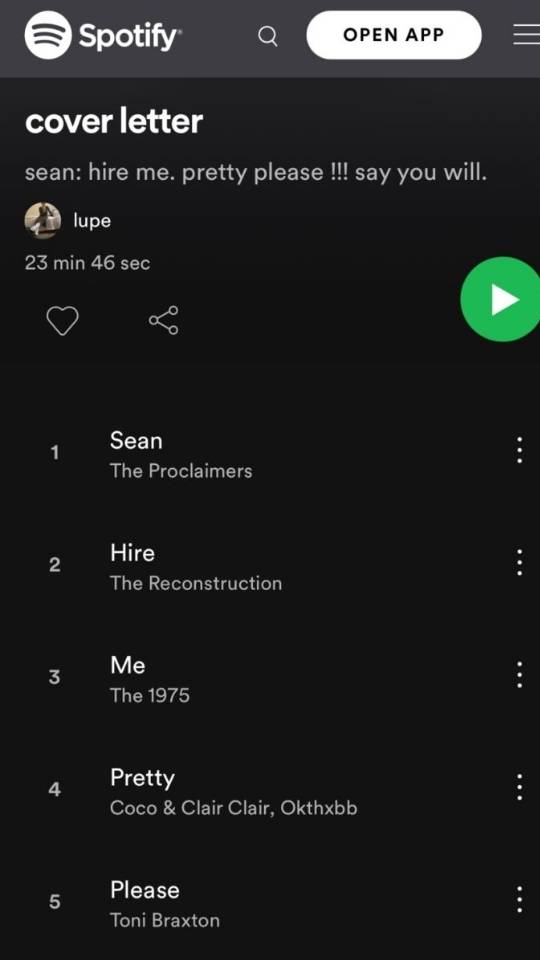
Latest Blog Posts

Celebrating Learning Disability Awareness Week 2024 with GRB
Celebrating Learning Disability Awareness Week 2024, we explore how graduates with learning disabilities can be seen, heard, and valued while navigating the job market.

The Ultimate Guide to Landing a Graduate Job in Operations
Explore the vibrant world of graduate jobs in operations, uncovering opportunities, skill requirements, and career paths for 18-24-year-old students entering the workforce.

Why STEM Graduates Should Consider a Career in Teaching
Discover the benefits of teaching. Learn how STEM graduates can utilise transferable skills to transform education. Pursuing a career in teaching can be a fulfilling and impactful choice.
Related Pages:
- Graduate CV
- Graduate Self Assessment
- Graduate Job Applications
- Personal Branding
- How To Make a Graduate Video CV
- Graduate Psychometric Testing
- Following Up Graduate Job Applications
- Graduate Assessment Centres
- When to Apply for UK Graduate Jobs
Please Login
Login and apply now.
- Log in
- Site search
Sample cover letter
Cover letters add context to your CV and when used correctly are a great way to convince employers that you're right for the job. This sample cover letter should help you get started
A cover letter demonstrates to recruiters how well you express yourself, so you need to make sure that you don't just repeat your CV or give rambling explanations. Instead, use this opportunity to focus on your skills and experience, saving your qualifications for your CV.
The basic cover letter structure covers:
- why you're writing the letter
- why you think you're suitable for the job (with examples)
- relevant skills and experience
- summary of your interest in the role.
Double check what you've written as spelling mistakes or lack of attention to detail will put your cover letter straight on the no pile.
Please be aware that this is an example. Use this cover letter template to help generate ideas and structure your own document but avoid copying and pasting. Your cover letter needs to be original and tailored to the job you're applying for.
Avril Lee 115 My Street Mytown WX55 1CQ [email protected] 07777999888
Harry Smith Graduate HR director Big Company Ltd Woodcotes Business Park The Midlands MX9 6PQ
5th May 2023
Dear Mr Smith
Re: Logistics graduate scheme
I would like to apply for the logistics track of your graduate training scheme, advertised on the Prospects.ac.uk website. As requested, I am enclosing my CV.
I am in the final year of my geography degree, expecting a 2:1. Always intending to have a career in business, I have taken modules on the geography of business and GIS modelling. My final-year dissertation is on changing patterns in retail. During my degree, I have developed my analytical skills and ability to read, manage and present data. I have also become familiar with a range of business intelligence sources.
As you can see from my CV I have experience in:
- Retail - moving from shelf stacker to checkout operator to team leader in my two years with Fresh Foods. I contributed to the store consistently being in the top five for the region by providing excellent customer service.
- Warehouse operations - picking and packing to meet targets over the busy Christmas period.
I have also:
- Worked in and led teams at Fresh Foods, on course projects and in sports.
- Communicated with colleagues at all levels in retail and warehousing.
- Solved problems as a team leader, ensuring staff cover and dealing with customer complaints.
- Worked flexibly doing both early and late shifts and covering for absence, sometimes at short notice.
- Managed my time when combining study with work and sport.
My semester in Germany exposed me to a different culture and improved my language skills. In addition, my voluntary work with young people has increased my resilience and ability to mix with people from all walks of life.
I look forward to hearing from you.
Yours sincerely
(Sign your name here)
Find out more
- Get more information on cover letters .
- If you're applying for a job that's not advertised take a look at an example speculative cover letter .
- Learn more about the 5 things to avoid when writing a cover letter .
How would you rate this page?
On a scale where 1 is dislike and 5 is like
- Dislike 1 unhappy-very
- Like 5 happy-very
Thank you for rating the page
- Phone: +91 8466016171
- Whatsapp: +91 8208375580
- Email: contact@leapscholar.com
Letter of Recommendation for PhD: Sample, Examples & PDFs
- Last Updated On August 14, 2024
- Published In General

Did you know that by 2030, over 8,00,000 people in the US will get their doctorates? That’s a lot of competition! To stand out, you need more than just strong grades. Letters of recommendation offer a crucial personal perspective on your research abilities.
Table of Content
These letters, written by professors or supervisors, highlight your potential and confirm your application’s claims. Admissions committees rely on them to make informed decisions.

Excel in IELTS with India’s Top Online Coaching
Leap has helped more than 1 Lakh students achieve 7+ IELTS band.
This guide will help you create an influential letter of recommendation for a PhD that opens doors and advances your academic journey. Dive in!
Key Highlights
Here is a quick overview of everything you will learn in greater detail in this blog on the letter of recommendation for a PhD program.
| Types of Letter of Recommendation for a PhD Program | Academic LOR, Professional LOR |
| Word Limit | 400-500 words |
| Formatting | : Times New Roman | : 10 to 12 | : 1-inch |
| Common Mistakes to Avoid | Open Communication, timely submission, highlight strengths |
What is a Letter of Recommendation for a PhD Program?
A Letter of Recommendation, or LOR, is a crucial component of your PhD application. It provides valuable insights into your academic brilliance, personal character, and research potential from a trusted source, such as a professor or employer.
Many universities in the United States, such as Harvard University and Stanford University , mandate the submission of two to three academic Letters of Recommendation for PhD applicants.
Crafting a compelling LOR can be challenging, which makes having a sample LOR an invaluable resource. By studying a well-structured sample, you can effectively highlight your strengths and experiences, impressing the admissions committee.
What is the Need for Letter of Recommendation for a PhD Student?
A letter of recommendation is crucial for PhD students because it offers a detailed look at your academic skills, research potential, and personal qualities from someone who knows you well.
Universities like Stanford require three letters of recommendation for their PhD programs. Admissions committees use these letters to understand your past achievements, work ethic, and fit for advanced study.
LOR’s often highlight your strengths, accomplishments, and specific contributions to research projects. This outside perspective helps set you apart in a competitive selection process, showing you have the skills, dedication, and curiosity needed for the program.
Whom Should You Ask for a Letter of Recommendation for a PhD?
Selecting the right recommender is critical in crafting a compelling letter of recommendation for a PhD. Your recommender should be a determined advocate capable of providing an unbiased assessment.
Given that 25% of the US’s one million foreign student population is Indian, competition is fierce. Unlike self-authored documents, an LOR offers an external perspective exclusively shaped by the recommender’s observations. This unique viewpoint is invaluable.
Your PhD recommender should be someone who:
- Has a good rapport with you.
- Understand your strengths, weaknesses, and potential.
- Has witnessed your academic and professional growth.
- Is familiar with your research interests.
- Believes in your research goals.
2 Types of Letter of Recommendation for a PhD Program
Securing admission to a prestigious PhD program like MIT’s is highly competitive. A critical factor in your application is the strength of your Letters of Recommendation (LORs). Universities like MIT often require three LORs, with a strong preference for academic references who can testify to your research potential.
Of course, you might be eager to check out a sample letter of recommendation for a PhD. However, you first need to understand the types of LORs, listed below.
1. Academic LOR
An academic LOR is typically penned by a professor or academic advisor who can confirm your intellectual abilities and scholarly potential.
A letter of recommendation for a PhD dives deeper into your research aptitude, critical thinking skills, and independent research capabilities. This type of recommendation emphasises your readiness for doctoral-level research.
2. Professional LOR
A professional LOR is typically authored by a supervisor or manager from your workplace. A letter of recommendation for a PhD from an employer should emphasise your research contributions, problem-solving abilities, and potential for independent scholarly work.
It should demonstrate how your practical experience has equipped you with the foundation to excel in doctoral studies.
Explore all countries
Letter of recommendation for phd sample: structure.
When constructing a compelling letter of recommendation for a PhD program, academic and professional recommendations are typically the most sought-after types. These letters are the unsung heroes of your application, providing crucial external validation of your qualifications.
Here’s a quick overview of a Letter of Recommendation (LOR) sample structure.
| Address by name (“Dear Mr./Mrs./Dr. [Last Name]”) or “To Whom It May Concern.” | |
| Introduction of the recommender and relationship with the candidate. | |
| Overview of your critical abilities and strengths. | |
| Specific examples of your achievements. | |
| Reaffirm confidence and provide contact information. | |
| Mention name and signature. |
Letter of Recommendation for PhD Sample: Format
While you’re likely engaged in GRE preparation and other PhD application requirements, don’t forget to notice the critical role of a strong letter of recommendation for a PhD. This document can significantly influence your admission chances, making crafting a compelling and well-structured LOR essential.
Here is the format you need to follow for your sample letter of recommendation for PhD.
| Pages | 1-2 pages long |
| Paragraphs | 5-6 paragraphs |
| Font Type | Times New Roman |
| Font Size | 10 to 12 point |
| Margins | 1 inch on all sides |
| Line Spacing | Single-spaced with double space between paragraphs |
| Alignment | Left-aligned |
| Header | Optional bold for name and title |
| Salutation | Optional bold for addressing |
| Closing Statement | Optional bold for final endorsement |
| Signature | Optional bold for name and title |
Letter of Recommendation for PhD Sample
A sample letter of recommendation for a PhD program can provide valuable guidance in crafting a compelling recommendation. However, it’s essential to remember that these samples are for illustrative purposes only and should not be copied directly.
Below, you’ll find sample LORs for the two primary types of recommendations: academic and professional. These examples demonstrate how your professors or supervisors can effectively articulate your qualifications for doctoral studies.
Academic Letter Of Recommendation for a PhD: Example
DISCLAIMER: The name “Rose Tennent” is used in this sample LOR for illustrative purposes only.
Dr. [Full Name]
Professor of [Department]
[University Name]
[University Address]
[City, State ZIP Code]
[Email Address]
[Phone Number]
I am delighted to write this letter of recommendation for Rose Tennent, who has been an exemplary student in my [Course Name] class at the [College/University Name]. I have had the privilege of teaching Rose for the past [Mention Years], during which time she has consistently impressed me with her intellectual curiosity, dedication, and exceptional academic abilities. Rose has consistently demonstrated a profound understanding of [Subject Area] concepts and theories. Her ability to analyse complex problems, develop innovative solutions, and articulate her ideas clearly is exceptional.
For instance, in a class project on [Project Topic], Rose took the initiative to explore [Specific Aspect of Project] in depth. Her research was meticulous, and her findings were presented clearly and precisely. Beyond her academic achievements, Rose has shown a remarkable aptitude for [Specific Skill, e.g., data analysis, research methodology]. Her proficiency in [Software or Tool] was evident in her coursework, where she produced exceptional results. Her ability to [Specific Skill Application] significantly enhanced her work’s quality and demonstrated her research potential.
Rose’s dedication to her studies is unparalleled. She consistently sought opportunities to challenge herself inside and outside the classroom. She participated actively in class discussions, offering insightful perspectives and stimulating intellectual debate. Her enthusiasm for learning is contagious, and she can inspire and motivate her peers.
Furthermore, Rose has demonstrated exceptional research potential. As a research assistant on my project, [Project Title], she significantly contributed to data collection, analysis, and interpretation. Her attention to detail and strong analytical skills allowed her to identify patterns and trends that were instrumental in advancing our research. Rose is also a highly collaborative and supportive classmate. She is always willing to help her peers and has a strong sense of teamwork. Her positive attitude and infectious enthusiasm create a supportive learning environment for everyone.
In conclusion, Rose Tennent is an exceptional student with a bright future. Her intellectual abilities, strong work ethic, and collaborative spirit make her an ideal candidate for a PhD program. I wholeheartedly recommend her for admission to your program and am confident she will significantly contribute to your academic community. Please do not hesitate to contact me if you require any further information.
[Full Name]
Professional Letter Of Recommendation for a PhD: Example
DISCLAIMER: The name “John Smith” is used in this sample LOR for illustrative purposes only.
Research Scientist
[Company Name]
[Company Address]
I am delighted to write this letter of recommendation in solid support of John Smith, who has been an exceptional research team member at [Company Name] for the past three years. During this time, I have had the pleasure of directly supervising John Smith and witnessing firsthand his remarkable intellectual abilities, unwavering dedication, and exceptional problem-solving skills.
John Smith has consistently exceeded expectations in his role as a research scientist. His contributions to our team have been invaluable, particularly in [specific research area]. For instance, his pivotal role in the [project name] initiative was instrumental in achieving [specific outcome]. John Smith demonstrated a deep understanding of the complex challenges associated with this project and developed innovative solutions that significantly advanced our research goals.
One of John Smith’s most impressive qualities is his ability to blend theoretical knowledge with practical application seamlessly. His work on [specific project or task] is a prime example. By [briefly describing particular actions taken], John Smith could [quantifiable result]. This achievement highlights his exceptional analytical skills and ability to translate complex scientific concepts into tangible outcomes.
Beyond his technical expertise, John Smith possesses exceptional interpersonal and communication skills. He is a collaborative team player who readily shares his knowledge and insights with colleagues. His ability to articulate complex ideas clearly and concisely has been invaluable in internal and external presentations. John Smith has also taken on leadership roles within the team, mentoring junior researchers and fostering a positive and productive work environment.
John Smith’s enthusiasm for research and relentless pursuit of knowledge are truly inspiring. He is constantly seeking out new challenges and opportunities for growth. For example, [describe a specific instance of initiative or self-directed learning]. This proactive approach to his work demonstrates his intellectual curiosity and commitment to professional development.
I am confident that John Smith possesses the intellectual capacity, technical skills, and personal qualities necessary to excel in a PhD program. His strong foundation in [specific field] and his passion for research make him an ideal candidate for advanced studies. I wholeheartedly recommend John Smith for admission to your program, and he will be a valuable asset to your research community. Please do not hesitate to contact me if you require any further information.
Struggling with your LOR? Join LeapScholar’s live events now! Network with other students and get expert advice on how to create a winning recommendation letter.
Vocabulary for Writing a Letter of Recommendation for a PhD Program
A compelling Letter of Recommendation (LOR) requires proper structure and precise language. The words used can profoundly influence the admissions committee’s perception of you.
Below, you’ll find a selection of vocabulary to enhance your LOR’s impact.
Remember, these words are merely suggestions to complement your writing, and thoughtful use will improve your LOR’s professionalism and appeal.
| Introduction | Delighted, Exemplary, Privilege |
| Academic Achievements | Outstanding, Exceptional, Remarkable |
| Technical Skills | Proficient, Adept, Innovative |
| Research Contributions | Significant, Inventive, Insightful |
| Problem-Solving Abilities | Analytical, Ingenious, Resourceful |
| Personal Qualities | Dedicated, Motivated, Collaborative |
| Professional Experience | Leadership, Initiative, Reliable |
| Communication Skills | Articulate, Persuasive, Eloquent |
| Teamwork | Cooperative, Synergistic, Supportive |
| Conclusion/Recommendation | Confident, Highest Recommendation, Ideal Candidate |
Letter of Recommendation for a PhD Program: Guidelines for Top Universities
When universities offer PhD programs, they want to pick candidates who can work well with mentors and achieve great results. They expect you to be dedicated and focused on your chosen field.
Letters of recommendation are crucial in helping them find the right fit. You will find the requirements for a letter of recommendation for a PhD from the famous institutions listed below.
| 3 | |
| Stanford University | 3 |
| 3 | |
| 2 | |
| 3 |
8 Tips to Write A Better Letter of Recommendation for a PhD Program
Are you aspiring to join the ranks of 1.3 million Indian students pursuing higher education, such as PhDs abroad ? Then, crafting exceptional LORs is crucial.
This section will highlight typical letter of recommendation for a PhD program mistakes to avoid. A little motivation: The average monthly salary for a research scientist in the US and UK is INR 1.2Cr ($144K) and INR 55.8L (£52K).
Now, please find below the essential tips for writing a compelling letter of recommendation for a PhD program.
- Strategic Recommender Selection: Carefully choose recommenders who align with your PhD program’s requirements and can effectively highlight your strengths.
- Open Communication: Maintain regular contact with your recommenders, sharing your research goals and achievements to provide them with plenty of information.
- Diverse Perspectives: Encourage each recommender to focus on different aspects of your qualifications to create a well-rounded picture.
- Timely Submission: To avoid last-minute stress, ensure that online recommendation forms are submitted well in advance of the application deadline.
- Authenticity and Accuracy: Emphasise the importance of honest and detailed information in the LOR, avoiding exaggeration or false claims.
- Clear Relationship: The recommender’s relationship with you should be established within the letter.
- Highlight Strengths: The LOR should effectively showcase your unique qualities, abilities, and potential for doctoral research.
- Avoid Generic Templates: Encourage recommenders to write personalised letters that avoid generic or formulaic language.
To Conclude
Imagine yourself studying for a PhD at prestigious institutions like Stanford University or Oxford University , followed by a fulfilling career as a research scientist earning competitive salaries—up to INR 1.2Cr ($144K) and INR 55.8L (£52K) per year, respectively.
Achieving this dream begins with a strong Letter of Recommendation for a PhD program. Our expert counsellors at Leap Scholar are dedicated to helping you craft a standout LOR and guiding you through the entire admissions process. Let us help you realise your potential.
Take the first step towards your ideal future. Book a consultation now .
Also Read: Study PhD Abroad for Indian Students
Frequently Asked Questions
Q. what is a letter of recommendation for a phd.
A. A Letter of Recommendation for a PhD is a critical document in your application process. It provides insights into your academic brilliance, personal character, and research potential from a trusted source, such as a professor or employer. This letter helps admissions committees evaluate your readiness and fit for a doctoral program.
Q. Who should I ask to craft a Letter of Recommendation for my PhD application?
A. It’s essential to choose recommenders who know you well and can confirm your abilities. Ideally, this would be a professor familiar with your academic performance or a supervisor who understands your professional contributions. They should be able to provide a detailed assessment of your strengths, achievements, and potential for research.
Q. How many Letters of Recommendation do I need for a PhD application?
A. Most universities require two to three letters of recommendation for PhD applications. These letters should come from individuals who can attest to different aspects of your abilities and potential, ensuring a well-rounded view of your qualifications.
Q. What are the types of Letters of Recommendation for PhD programs?
A. There are two primary types of LORs: Academic and Professional. An Academic LOR is written by a faculty member who can highlight your intellectual abilities and research potential. A Professional LOR, on the other hand, is provided by an employer or supervisor who can discuss your skills and contributions in a workplace setting.
Q. How long should a Letter of Recommendation for a PhD be?
A. A typical LOR should be 400-500 words, spanning one to two pages. It should provide a comprehensive view of your qualifications, achievements, and potential without being overly verbose or too brief.
Q. How does a Letter of Recommendation for PhD admission impact my application?
A. A Letter of Recommendation for PhD admission is crucial because it provides an external perspective on your abilities, character, and potential as a researcher. This letter helps the admissions committee understand your readiness for a doctoral program by highlighting your academic achievements and personal qualities, offering insights beyond what grades and test scores can convey.
Q. How can a sample LOR help me write my recommendation?
A. A sample LOR can provide a useful template or guide, showing how to structure the letter and what elements to include. It helps you understand how to effectively highlight your strengths and tailor the letter to the specific program you’re applying to.
Q. How should I format a Letter of Recommendation for a PhD?
A. Use Times New Roman font, size 10 to 12, with 1-inch margins. The letter should be single-spaced with double spaces between paragraphs, left-aligned, and include the recommender’s signature and contact information.
Q. What common mistakes should be avoided in a Letter of Recommendation for a PhD?
A. Avoid generic or vague language, unclear descriptions of your relationship with the recommender, and late submissions. Ensure the letter is honest and detailed and highlights your strengths and unique qualities.
Q. Can a Letter of Recommendation for a PhD impact my application?
A. Absolutely. A strong LOR can significantly influence the admissions committee by providing validation of your academic and research capabilities. It adds a personal dimension to your application that grades and test scores alone cannot convey.
Q. What should I include in a Letter of Recommendation for a PhD application?
A. When writing a Letter of Recommendation for a PhD application, include details about your relationship with the applicant, their academic and research achievements, and specific examples of their skills and contributions. The letter should also discuss the applicant’s potential for success in a doctoral program, and why they are a strong candidate for the PhD program they are applying to.
Know More about Study Abroad
Essential guide: studying abroad tips.
30+ Universities for Study Abroad
- Arizona State University
- Northeastern University
- Coventry University
- University Of East London
- University Of Hertfordshire
- Conestoga College
- Humber College
- Centennial College
- University Of Birmingham
- Stanford University
- University Of Greenwich
- Columbia University
- Bpp University
- Texas A & M University
- University Of Maryland
- University Of Toronto
- University Of Melbourne
- University Of Waterloo
- New York University
- Mcgill University
- Harvard University
- University Of British Columbia
- University Of Alberta
- University Of Oxford
- University Of Cambridge
- University Of California Berkeley
- Yale University
- University Of Calgary
- Massachusetts Institute Of Technology (MIT)
Popular Blogs
- CGPA to GPA: Check How to convert 10 point CGPA to 4 point GPA
- Check How to Calculate Percentage to CGPA
- Top 10 Toughest Exams in the World 2024
Education counselling
- Study Abroad Consultants in India
- Study Abroad Consultants in Kochi
- Study Abroad Consultants in Delhi
- Study Abroad Consultants in Chennai
- Study Abroad Consultants in Hyderabad
- Study Abroad Consultants in Mumbai
- Study Abroad Consultants in Bangalore
- Study Abroad Consultants in Kolkata
- Study Abroad Consultants in Pune
- Study Abroad Consultants in Jaipur
- Study Abroad Consultants in Indore
- Study Abroad Consultants in Nagpur
- Study Abroad Consultants in Ludhiana
- Study abroad Consultant in Thiruvananthapuram
- Study abroad Consultant in Calicut
- Study abroad Consultant in Amritsar
- Study abroad Consultant in Thrissur
- Study abroad Consultant in Ahmedabad
- Study abroad Consultant in Vizag
- Study abroad Consultant in Noida
Khushi Rabban
A passionate writer who bridges the gap between aspiring international students and their dream schools.
My student-friendly content, powered by SEO magic, simplifies applications, tackles scholarships, and provide you with all the information you need, to conquer your international academic dreams.

AU Emerging Global Leader Scholar | American University | Study in USA

Singapore International Graduate Award (SINGA) 2025 - Eligibility Criteria, Benefits and Application Process

SOP for Civil Engineering: Sample, Example, How to Write
Love this blog share the love.

Get the best study abroad guidance
Start your journey with the best study abroad experts in India
- 2L+ Leap students sent abroad
- 2L+ students scored 7+ bands
Have Questions? Get Guidance to reach your Dream University
Connect with India's finest counsellors and biggest study abroad community.
Related Blogs

Leiden University Excellence Scholarship | Study in Netherlands
- August 14, 2024

Singapore International Graduate Award (SINGA) 2025 – Eligibility Criteria, Benefits and Application Process
- 13 min read
- 12 min read

SOP for Supply Chain Management: Sample & PDFs
- August 13, 2024
- 10 min read

List of Duolingo Accepted Universities in UK in 2024
- July 6, 2023

Duolingo Accepted Universities in Australia In 2024
- July 12, 2024
- 18 Min Read

Duolingo Accepted Universities in Ireland in 2024
- 11 Min Read

Duolingo Accepted Universities in USA for 2024 Intake
- April 20, 2023
- 10 Min Read

Top Universities in Netherlands: Fees, Eligibility & Application Process
- May 20, 2024
- 20 Min Read
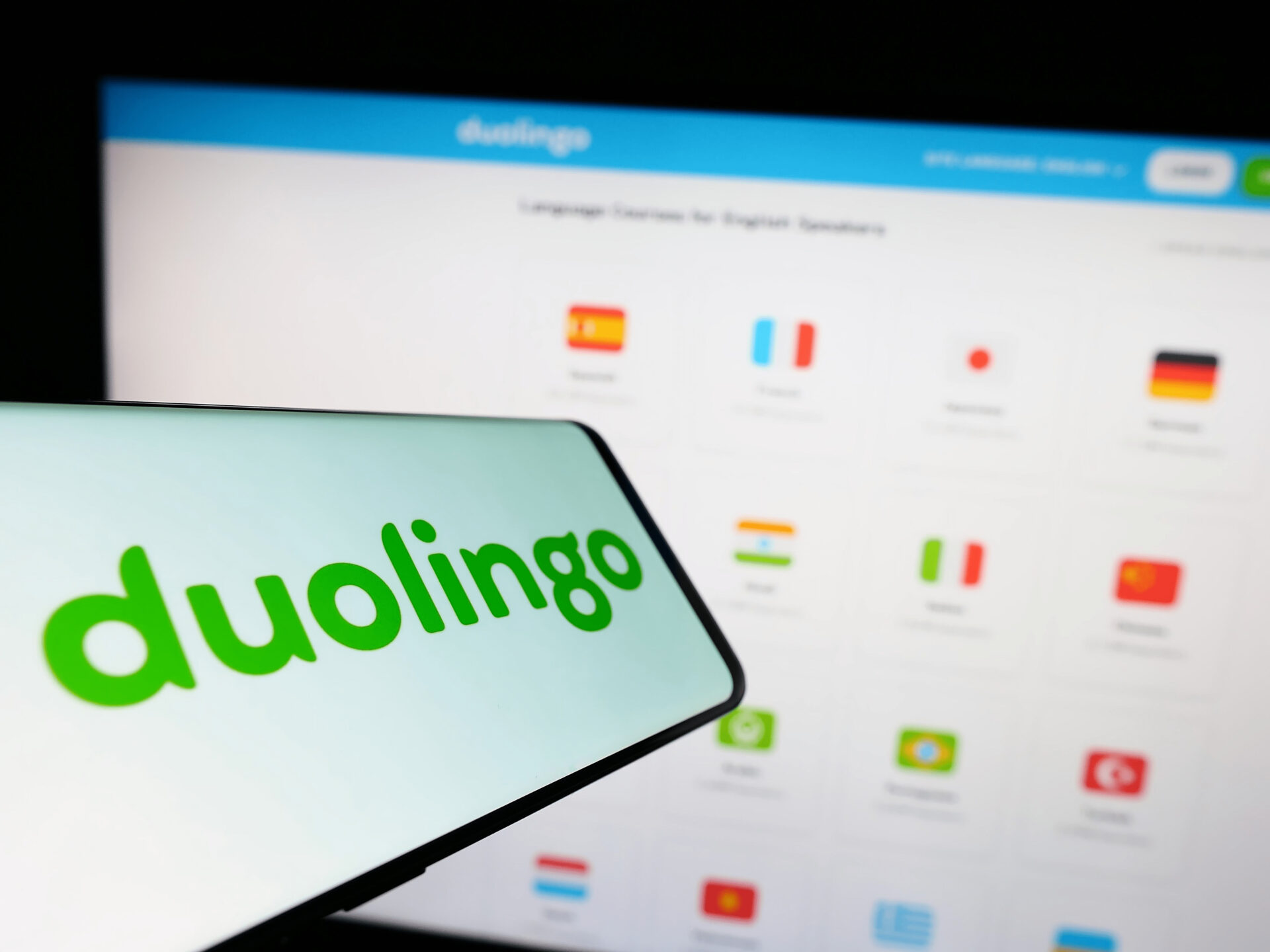
Duolingo Accepted Universities in Canada in 2024
- July 7, 2023
Crack IELTS with
7+ bands in 4 weeks.
Get Guidance to reach your
Dream university.
- Work & Careers
- Life & Arts
Jobhunters flood recruiters with AI-generated CVs
To read this article for free, register for ft edit now.
Once registered, you can: • Read this article and many more, free for 30 days with no card details required • Enjoy 8 thought-provoking articles a day chosen for you by senior editors • Download the award-winning FT Edit app to access audio, saved articles and more
Explore our full range of subscriptions.
Why the ft.
See why over a million readers pay to read the Financial Times.

IMAGES
COMMENTS
Choose the name of your profession and the company to which you're applying, and the LiveCareer cover letter builder will automatically adapt the content for you. Create a cover letter faster than you ever thought possible and apply for the job in record time. 2. Open the PhD cover letter with your motivation.
If possible, pick out keywords that you can weave throughout your cover letter. Example: "Peer-reviewed". "Methodology". "Thesis". "Data collection". End on an optimistic note by restating your potential value as a PhD hire, with a call to action that puts some onus on the faculty to follow up.
www.careers.cam.ac.uk V www.careers.cam.ac.uk The Careers Service helps you to prepare ... CVs & COVER LETTERS FOR PhDs & POSTDOCS GET READY TO APPLY PUT TOGETHER YOUR CV WRITE YOUR APPLICATION SAMPLE CVs & FURTHER HELP GET READY TO APPLY CV_brochure_1_V2.indd All Pages 10/08/2018 10:42 ... CVS AND COVER LETTERS FOR PHDS AND POSTDOCS 10 11 ...
Cover letters vs personal statements for a PhD application. Although there are similarities between a motivation or cover letter and a personal statement, they are different. A cover letter is more functional - it unites and presents your application. A personal statement is more useful for providing detail on your experience, interests and ...
This will give your cover letter a slick appearance and also give the recruiter all of the necessary contact information they need to get in touch with you. The information to add should include: A friendly sign off - e.g. "Kindest regards". Your full name. Phone number (one you can answer quickly)
Formal salutation. In an official letter like this one, you should address the reader in a professional and formal way. If you know who'll be reading your cover letter, go with Dear Dr. [Surname] or Dear Professor [Surname]. If you don't, go with Dear Sir/Madam. The specific PhD program or position.
As with all applications, writing a great cover letter is a skill. It requires you to tread the balance between explaining in detail who you are and why you should be chosen, while remaining concise. It needs to showcase your personality while remaining professional. It's a difficult writing skill and one which shouldn't be rushed.
Cover Letters for PhD grads A cover letter is your opportunity to make a positive first impression which conveys your suitability. Just as important as your CV, it is where ... [email protected] 07777 123456 Institute of Fictional Literature University of Imagination Kettering KT11 1OL 6th May 2021
Try to match the font size, type, line spacing and margin size to your academic CV for neat and consistent presentation. Your cover letter should be addressed to the PhD supervisor, starting with a "Dear [academic title] [surname]", for example, "Dear Professor Williams". Tip: Make sure to get the title of the supervisor correct.
To help you write an effective and organised PhD cover letter, below is a series of steps you can follow. These can help you break down your cover letter into distinct parts and be a general guide or template for when you write your own. The steps to writing a PhD application cover letter are as follows: 1. Do your research.
Addressing the Recipient. Begin your cover letter by addressing the recipient appropriately. Use a formal salutation such as "Dear [Supervisor's Name]" or "To the Admissions Committee.". Avoid generic greetings and take the time to research the correct contact details to demonstrate your attention to detail.
Professional PhD Cover Letter Examples... Your PhD cover letter must immediately highlight your main thesis contribution. Draw the reader's attention with a succinct explanation of your research significance and uniqueness. Demonstrate how your expertise aligns with the department or institution's academic focus.
How to write a cover letter for your Ph.D. application. Follow these steps to write your academic cover letter: 1. Review the program and organization information. Before crafting your academic cover letter, review the information you have about the program you're applying for. Avoid using the same cover letter for each organization, as they ...
Formal Closing: Opt for a formal and universally accepted closing such as Sincerely, Kind regards, or Best regards. Name and Title: Under the closing, type your full name. It's also a good practice to include your current academic title or designation, adding to the clarity and formality. PhD Cover Letter Example.
1. Greeting. Like any application letter, a cover letter for PhD a position should have a polite and professional greeting. It's best to address your PhD cover letter to a specific person, such as the head of the department or the admission team. 2.
2. Start with your contact information. Start writing your CV by listing your contact information. The necessary details to include are your: full name. email address. contact number. location. Make sure you include a professional email address and avoid using a work telephone number.
WHAT IS A COVER LETTER? A cover letter is sent with your CV as part of your application. ... Level 5, Sherfield Building - 020 7594 8024 | careers@imperial ac.uk Example covering letter for a graduate role: A.K Pharma Ltd. Central Square Winchester SO22 1AB Dear Ms Carter
A motivation letter is not an essay, but it does need to end with strong, clear concluding remarks. You should always restate your interest and briefly summarise key points you have made throughout the letter. The introduction and conclusion are the most important parts of any form of cover letter, as they are what stick in the reader's mind.
This includes uploading your CV/cover letter to CareerSet. Once you have completed the Pathway and made any changes suggested by CareerSet, you can then receive 1:1 feedback from a CV adviser. You can also send your cover letter (in Microsoft Word) to us for written feedback. This can take up to 5 working days.
Unlike email, letters are tangible and layout is as important as content. Graduate cover letters have a standard format and this is shown in the cover letter examples attached. If you are writing to a named person then it is 'Yours sincerely', if you write 'Dear Sir/Madam' the correct ending is 'Yours faithfully'. A graduate cover letter should:
A successful cover letter "hooks" an employer in the first paragraph. The first few sentences should show that you've done your research about the job or internship and the organization and should make an employer want to learn more about you. A cover letter is also the first writing sample that an employer sees from you.
You should use your cover letter to highlight relevant skills and experience in your CV without just repeating information. Keep your cover letter clear, well presented and visually attractive. Don't cram too much on the page. Check you've got the company name and other key details correct. Double check your spelling and grammar!
Your cover letter needs to be original and tailored to the job you're applying for. Avril Lee 115 My Street Mytown WX55 1CQ [email protected] 07777999888. Harry Smith Graduate HR director Big Company Ltd Woodcotes Business Park The Midlands MX9 6PQ. 5th May 2023. Dear Mr Smith.
Letter of Recommendation for PhD Sample: Structure. ... The average monthly salary for a research scientist in the US and UK is INR 1.2Cr ($144K) and INR 55.8L (£52K). Now, please find below the essential tips for writing a compelling letter of recommendation for a PhD program.
About half of applicants are using tools such as ChatGPT to help write cover letters but, without editing, the language is 'clunky' ... according to a survey of 2,500 UK workers from HR start ...